#intergenerational dialogue
Explore tagged Tumblr posts
Text
Traditional homes for older and younger generations
In central Europe, we are facing a real estate crisis. Renting a flat or house is become so expensive that it's even better to buy it (for those who can afford it.) On the other hand, retired people who are home owners cannot benefit social benefits. It's not easy for young family wanting to have a place to call their own to raise their children.
One of my older neighbour was telling me that he finds the cost of living so high, and selling his place won't amount to much as a big chunk will go off in taxes. The best solution would be for his adult kids to come back to live with them.
Many older people cling to their beloved homes until their children send them off to a retiring home (or they choose it themselves with dignity.) Many are heartbroken of leaving their homes. Wouldn't be easier if they were left to live in their own homes, with their family to help them? It wouldn't be easy, right. But wouldn't it be a gentler solution to these housings problems? Sending old people to homes doesn't make the rents go down. On the contrary... One big real estate venture is making retired people communities with facilities for them. Carting off those who have wisdom and insight in a closed enclosure of sorts? Though, there are some efforts being done to create old people homes near schools and young families. It's not the same thing as living your finally years in your own home, with the help of your loved ones (proper medical staff who can come for help).
We are so focused on getting what 'we/i' want that we have become individualistic creatures. We cannot bear other people... Not even those who gave us birth and raised us. So off we must go. It is the socially acceptable thing to do. We'd rather hire help to take care of our kids rather than accepting loving offers from family to take care of our children if we must go out to work or else.
For some, their parents are abusive and generally bad people... So they don't have a choice. But it's not the same for most people. (or at least I hope not.)
But I believe that if family lived together, it could solve many problems. Both the elders and the younger people can help each other. But it requires some sacrifice.... Perhaps, giving up on the fantasy sold to us by materialism and consumerism.
41 notes
·
View notes
Text
(Panel Session 12) - 6th World Forum on Intercultural Dialogue.
"Safeguarding our past and future: Cultural heritage in the face of Climate change"
Keynote speaker:
Ms. Saadat Yusifova, Deputy Minister of Culture of Azerbaijan
Moderator:
Mr. James Bridge, Chief Executive and Secretary-General of UK's National Commission for UNESCO
Panelists:
Dr. Jinfeng Zhou, Secretary-General of China Biodiversity Conservation and Green Development Foundation (CBCGDF)
Ms. Nupur Tron, Founder and Director General of Foundation Frison Horta
Dr. Hesham El Askary, PhD, Advisor to ICESCO Director-General
Dr. Paul Michael Taylor, Director of the Smithsonian's Asian Cultural History Program, Curator for Asia, Europe, and the Middle East in the Smithsonian's Anthropology Department, USA
Dr. Albino Jopela, Executive director of the African World Heritage Fund
Ms. Sabina Hajiyeva, Head of the State Service for Protection, Development, and Restoration of Cultural Heritage, Azerbaijan
H.E. Adam Al Mulla, Ambassador, Permanent Delegate of the State of Kuwait to UNESCO
Related Sites and Documents
6th World Forum on Intercultural Dialogue website Baku Process Home Page
Watch the (Panel Session 12) -6th World Forum on Intercultural Dialogue!
The 6th World Forum on Intercultural Dialogue will be held in Baku, Azerbaijan, 1-3 May, under the title "Dialogue for Peace and Global Security: Cooperation and Interconnectivity".
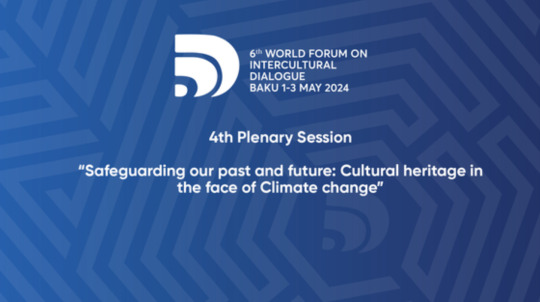
#plenary session#global security#climate crisis#forum#world forum on intercultural dialogue#intercultural dialogue#unesco#arts and culture#climate change#dialogue for peace#cooperation#intergenerational dialogue#cultural goods
0 notes
Text
The Future of Climate Change Education and Education for Sustainable Development "An Intergenerational Dialogue between Young People and Key Global Players".
This side event will include an intergenerational dialogue between young people and key global players in climate change education with a view to contributing to recommendations for COP28.
Side Event at the SDG Action Weekend organized by Permanent Mission of The State of Qatar to the United Nations, Permanent Mission of the Kingdom of Morocco to the United Nations, Education Above All Foundation, Generation Unlimited (UNICEF), Silatech.
To maximize the SDG Summit's impact, the Secretary General is convening an SDG Action Weekend, which will generate opportunities for stakeholders, UN entities, and Member States to convene inside the United Nations Headquarters and set out specific commitments and contributions to drive SDG transformation between now and 2030.
The SDG Action Weekend will consist of the SDG Mobilization Day on Saturday, 16 September, and the SDG Acceleration Day on Sunday, 17 September at UNHQ in New York.
The SDG Action Weekend includes a select number of high-level side-events identified through an open call that concluded in August. They are jointly organized by coalitions of Member States, UN agencies and other international organizations, and global stakeholder networks.
#Young People#sdg4#education#sustainable development goal 4#intergenerational dialogue#sdg13#agenda 2030#Sustainable development goals#stakeholders#united nations entities#member states#Permanent Mission of The State of Qatar to the United Nations#Permanent Mission of the Kingdom of Morocco to the United Nations#Education Above All Foundation#Generation Unlimited (UNICEF)#Side Event#Education 2030
0 notes
Text
Youth as Peacemakers: Engaging Young Leaders in Eastern European Peace Processes
by Emancip8 Project
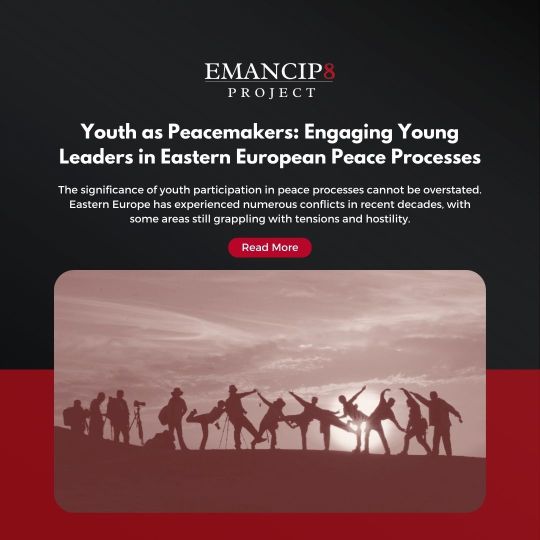
The significance of youth participation in peace processes cannot be overstated. Eastern Europe has experienced numerous conflicts in recent decades, with some areas still grappling with tensions and hostility. As a new generation emerges, it is essential to engage young leaders in peace-building initiatives and capitalize on their energy, creativity, and resilience. This article delves into the role of young people in Eastern European peace processes, highlighting their potential contributions and the importance of creating space for their involvement.
Young leaders possess unique qualities that make them valuable agents of change in peace-building efforts. Growing up in a digital age, they are connected and informed, and can harness the power of technology to promote dialogue and bridge divides (Purdeková et al., 2018). Furthermore, youth are often more open to new ideas and perspectives, allowing them to challenge traditional narratives and seek innovative solutions (McEvoy-Levy, 2006).
In Eastern Europe, several successful examples demonstrate the potential of youth engagement in peace processes. In Bosnia and Herzegovina, young people have formed interethnic networks and organized grassroots initiatives to foster dialogue and understanding among their peers (Graffikin, 2016). Similarly, in Kosovo, youth-led organizations have played a significant role in promoting reconciliation through cultural and educational programs (Haziri-Goepfert, 2018).
Despite their potential, young people face numerous challenges in their quest to contribute to peace processes. Societal expectations and political barriers often limit their access to decision-making spaces, resulting in tokenistic engagement or exclusion from formal negotiations (Belloni, 2012). Moreover, they may lack the necessary resources, skills, and networks to maximize their impact (Purdeková et al., 2018).
To ensure meaningful youth participation in peace processes, several strategies can be employed. First, promoting intergenerational dialogue is crucial to creating inclusive spaces where young people can learn from older generations while contributing their perspectives (McEvoy-Levy, 2006). Second, capacity-building programs can equip young leaders with the skills and knowledge needed to navigate complex peace-building environments (Haziri-Goepfert, 2018). Finally, fostering partnerships between youth organizations, civil society, and international actors can enhance the legitimacy and impact of youth-led peace initiatives (Graffikin, 2016).
In conclusion, engaging young leaders in Eastern European peace processes is crucial to fostering sustainable peace and development in the region. By recognizing their potential and addressing the challenges they face, society can harness the power of youth as peacemakers and ensure a more inclusive and resilient future.
References:
Belloni, R. (2012). Civil society and peacebuilding in Bosnia and Herzegovina. Journal of Civil Society, 8(1), 45–63.
Graffikin, L. (2016). Youth peacebuilding in Bosnia and Herzegovina: An exploratory study. Peacebuilding, 4(3), 278–291.
Haziri-Goepfert, S. (2018). The role of youth in peacebuilding in Kosovo. In S. M. Yazdani (Ed.), Conflict transformation and peacebuilding: Experiences from Central Asia and the Western Balkans (pp. 111–130). Routledge.
McEvoy-Levy, S. (2006). Troublemakers or peacemakers? Youth and post-accord peace building. Notre Dame, IN: University of Notre Dame Press.
Purdeková, A., F. Omata, and E. V. Berghof. (2018). Refugee-led assistance and protection: From research to practice. Forced Migration Review
Read more at Emancip8 Project.
#youth-led reconciliation#Emancip8 Project#young leaders in peace processes#intergenerational dialogue#Eastern European conflict resolution
0 notes
Text
I keep remembering my mashcast episode drops this saturday... beejgirls gather round for deep breathing exercises
#less nervous for this one than my s6 one but still like maaaaan what if they find out I'm inarticulate. cringe#if nothing else rob and I had a great conversation about queer coding that I hope leads to more intergenerational MASH dialogue 🙏🏻
13 notes
·
View notes
Text
15 Questions 15 Mutuals
The rules are: Answer the 15 questions and tag 15 of your mutuals.
Thanks @kinglazrus for the tag :D
1. Are you named after anyone? Technically yeah
2. When was the last time you cried? about a month ago i think; i was sitting in a pretty empty Tim Horton's and teared up about something or other that i've since forgotten about
3. Do you have kids? nope!
4. What sports do you play/have played? Track and Field, Softball, and Basketball briefly.
5. Do you use sarcasm? Me? Sarcasm? Never. ( :3 )
6. What's the first thing you notice about people? oh god dude i dont know, probably whatever's the most colourful thing on them
7. What's your eye color? Brown
8. Scary movies or Happy endings Happy endings pls. I can't handle scary movies at all.
9. Any talents? uhhhhhhhhhhh i dont think so
10. Where were you born? Canada
11. What are your hobbies? Writing, doodling, reading fic & fiction books, watching anime. Also playing a handful of very specific games.
12. Do you have any pets? no, BUT my cousin has a dog and he is a very sweet boy and i love him with all my heart
13. How tall are you? 5'7 and a half. or smth like that
14. Favourite subject in school Writer's Craft and. Accounting. [HEAR ME OUT, high school accounting classes were hella easy so i NEVER had homework to take home because i always got it done in class and then it was just. idk. weak sauce so most of the time i was goofing off.]
Runner ups are Marketing and International Business because I had the same teacher for that class and he didn't give a shit if you were late or absent or w/e, but if you were going out for food or something, he'd give you some cash and ask you to bring him some coffee and we were all chill. He let me use his empty classroom to eat lunch in too aaa. Mr. M you were quite literally the best. [Also, one time, despite being the Good Student and also taking the bus to school, the student council president was like "hey you wanna go to Tim's" and I was like "yeah sure" because I was playing it cool but genuinely. Ditching school to go to Tim's during school time as a high schooler was such a magical experience. okay im done now]
Favourite university class was Participatory Media and Communication hands fucking down, very specifically the assignments were always amazing and mostly carte blanche and the topics did not shy away from the harsh stuff and encouraged lots of discussion and analysis on the people and groups we were reading about. like, learning about the origins of BLM Canada, analyzing parts of The Finkelstein 5 by Nana Kwame Adjei-Brenyah and Boys Go To Jupiter by Danielle Evans, the AIDS crisis in Canada, or how black queer people faired during the 80s. There was other stuff, but uh, *cough* those four bits really stuck with me for totally no reason whatsoever <- black queer person who likes learning about and discussing black, queer, and black queer history
15. Dream Job? shit man idk. whatever pays the bills and i don't hate completely. i dont really like the thing i majored in anymore, but woodworking/carpentry seems cool
Tags! @kawaiijohn @echoghost1 @sheepheadfred @goliath-de-senfina-sango @princessfanonanona @redead-red @ectoplasmicsoda @ln-ofx @grub-xd @ghost-pasta @themockingcrows @bubblegumbeech @redajcted @glorious-typo @basedstoutland
(feel free to join in or ignore)
#ask game#woops ask me about my favourite classes and i'll never shut up about them#also its kinda funny to me that the other questions were like a couple sentences tops and then. 3 paragraphs. then two sen.s for the last#lmao#im still so proud of the last assignment i did in that class aaaaa#really wish i recorded it but also. i would never post it bc thats how you get hate anons lmfao#(it was about intergenerational dialogue and discussions on sex positivity <3)
6 notes
·
View notes
Text
Shoutout to Indigenous systems on this day for Truth and Reconciliation!
Today, September 30th, is the Canadian National Day for Truth and Reconciliation. This is a day of remembrance for victims and survivors of Indian residential schools in Canada, though it could likely apply to those who live on Turtle Island in general.
If your system or someone you know is or knows a survivor of an Indian residential school, or has a loved one who did not survive their time in a residential school, our hearts go out to you. We are wishing for you and family a future full of strength, peace, and resilience. Inter-generational trauma can have significant impacts, and the pain imposed on your loved ones and ancestors should not be forgotten as time passes. We hope that their lives can be honored and remembered throughout history, and we want to do our part to help preserve their legacy.
For allies of Indigenous peoples, if you are able to, please wear an orange shirt today to honor those whose lives were forever changed due to the negative impact residential schools has left on indigenous communities. Remember that, even today, Indigenous peoples face hardships, disparities, and inequalities in our society. The closure of residential schools does not mean rest, healing, and proper compensation for the victims of such institutions. Let’s vow as a community to make our spaces safe and accepting of Indigenous systems, and do our part to educate ourselves on their histories so that we may be better allies in the future.
Friends, please show some support to the Indigenous people in your lives today, and do not take their presence for granted. Take a moment to learn more about the history of Indian residential schools in Canada and the United States, and the grim legacy they have left which many Indigenous communities are still dealing with today. If you are able to, please reach out to the Indigenous systems and non-systems in your lives to provide support in whatever ways they have requested.
We will include links to sites and organizations where you can learn more about the Canadian National Day for Truth and Reconciliation and the history of Indian residential schools in both Canada and the USA, along with links where you can directly support survivors of Indian residential schools. Remember, if you cannot support these organizations or individuals financially, you can show your support by educating yourselves and providing a space in your own communities where Indigenous voices can be acknowledged and uplifted.
Indigenous systems, we love you, we are in your corner, and we want to support and uplift you however we can. Please do not hesitate to get in touch if there is anything we can do to help make our spaces more welcoming for you. You have an important and treasured place in the plural community, and we are honored to be able to share this space with you. We hope that you can do your best to treat yourselves and your system with compassion and gentleness today, and take care!

‼️ Non-indigenous systems are welcome and encouraged to reblog, but DO NOT derail or try to center your voice over actual indigenous systems and those who are actually affected by inter-generational trauma due to Indian residential schools!‼️
#plurality#pluralgang#multiplicity#actuallyplural#plural positivity#system positivity#plural pride#system pride#indigenous systems#indian residential schools#intergenerational trauma#day for truth and reconciliation#orange shirt day
149 notes
·
View notes
Text
You love taking care of people: Fine Dining in the Time of Late Stage Capitalism
CW: this post discusses toxic and abusive workplaces and makes brief mention of institutional child abuse and intergenerational trauma. I might also talk about global systems collapse, for shits and giggles. Also this is another long one. You know the drill. Lets have a cuppa. Also this is my last minute submission to Sydcarmy Week 2024 and the theme of “you love taking care of people”. Enjoy!
I have a confession to make to The Bear fandom:
The food is my least favourite part of this show.
Its not that its not interesting. It definitely is. I'm a home cook and for the most part, I enjoy cooking (when I can do it at my leisure and not like most mothers, while balancing the mental load). I just find all the other aspects of the show much more fascinating.
In fact, I think this show about a bunch of cooks in commercial kitchens is so popular not so much because of its take up of cooking but its unflinching and loving interrogation of grief and trauma, including the kinds that get passed down through families.
The truth is, I've also never been overly excited about the world of "fine dining." I grew up in a large, Tamil family and so our meals were big, shared and not necessarily conducive to the minimalist plating preferred in exclusive, "gourmet" spaces:
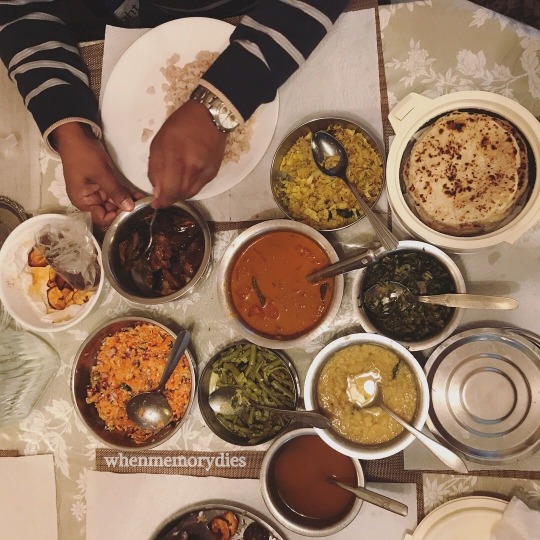
Photograph is mine, delicious Jaffna Tamil spread is the handiwork of my great aunt (Kunchi Ammamma or “little maternal grandmother”), arguably the best cook in our sprawling, extended family.
As tumultous as family life could get, I often experienced meals (that, lets be real, were almost always prepared by the women in my family) with my loved ones as a happy experience. I mean we also had our share of blow ups at the kitchen table but what was always consistent was the love and care that went into the food that we were given to eat. It was woven into the rich and complex flavours that made up the curries, varais, and sambals we had on our plates (and that even now, make me salivate just thinking about). It was spread throughout the warm, coconut-y rotis and steaming rice and puttu we ate with our hands and used to mop up all that spicy, flavourful goodness.
And if there's one question I heard more than any other from older family members growing up, it was "ni sappittiya?" ("have you eaten?"). More than "how are you?" and definitely more than "I love you." As with many Global South cultures, for Tamil folks, food is used for nourishment but also as a primary means of conveying deep care. Obviously Tamil people don't have the monopoly on using food to show their affection (or even the monopoly on using food to replace actually saying the words "I love you" lmao). Food has been found to increase interpersonal closeness and can also contribute to emotional regulation. Feeding a child is one of the first means of bonding between parents and children. Food also plays a big role in the course of romantic love: as a basis for first dates and future time spent with a partner, and of course also as an aphrodisiac.
As Cesar Chavez, Mexican-American civil rights activist, labor organiser and co-founder of the National Farm Workers Association (which later became the United Farm Workers union) said,
The people who give you their food, give you their heart.
You love taking care of people
Conveying care and love through food is a theme that comes up repeatedly in The Bear. Recall 1x02 Hands and the phone conversation with Nat and Carmy:

Natalie: Chefs always say a big part of the job is taking care of people, right?
Carmen: Yeah, yeah. No I guess.
Also recall an almost identical bit of dialogue between Carmy and Sydney, under the world's most famous table that had absolutely nothing wrong with it in 2x09 Omelette:

Carmen: You love taking care of people.
Sydney: Yeah I guess.
Here's some further mirroring between Sydney and Carmy about giving people joy through food. Recall again the phone call between Carmy and Nat in 1x02 Hands:
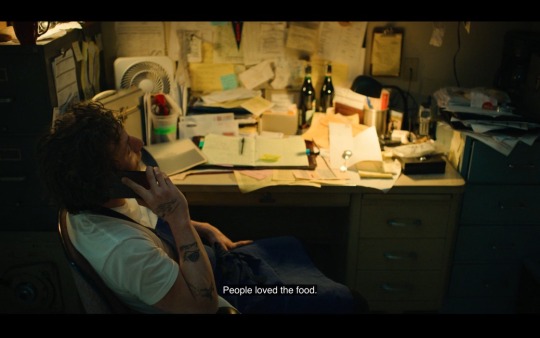
Natalie: When did the breathing problem start?
Carmen: I think maybe sometime in New York. I was throwing up every day before work.
[...] Chef was a piece of shit.
Natalie: Then why'd you stay there?
Carmen: People loved the food. It felt good.
Also recall the conversation between Sydney and Marcus in 1x08 Braciole:
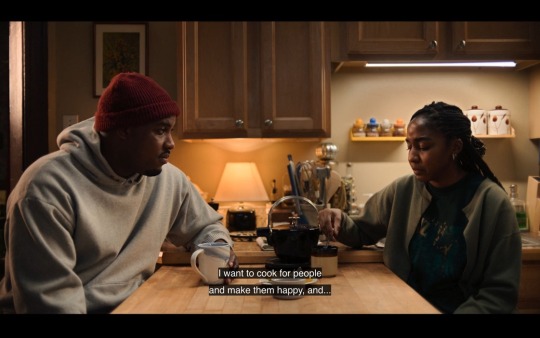
Sydney: I want to cook for people and make them happy, and give them the best bacon on Earth.
Be gentle with each other, so that you can fight stronger together: seasons 1-2 of The Bear
As rough and tumble as The Beef was, the clear throughline in season 1 (when The Beef was in operation) was the importance of the relationships and care between the show's characters. This was also the case in season 2 where the majority of the season was spent in the context of renovations and training prior to the opening of The Bear (in that season's last episode).
In season 1, we had Carmy leading the crew at The Beef by being patient, clearly explaining technique and positively reinforcing his staff's work.

Above left: Carmy walking the BOH crew through making Donna Berzatto's Lemon Chicken Piccata in 1x05 Sheridan. Above right: Carmy encouraging the crew to keep up their current pace in 1x06 Ceres.
We saw him working with Sydney, supportively encouraging the team to go further, to push themselves. We even saw Carmy at ease enough to talk about Mikey and his mother while at work. We had a Carmy showing us how integrated he can be.

Above: Carmy and Tina in 1x05 Sheridan
Heck, we even had a Carmy who wanted to get a compost installed at The Beef for processing food so that it didn't go to waste. Recall this golden bit of dialogue between him and Sweeps in 1x01 System:
Carmen: Eh yo Gary, you set up a compost for me today, Chef?
Sweeps: After I do my thing in the place.
Carmen: That's very clear. Thank you.
We had a Carmy who had time. Recall the below scene in 1x02 Hands before Sydney gives Carmy her draft business plan for The Beef (that she drafted on her own initiative and time to support his family's struggling business. If this man doesn't hurry up and fight for her in s4 istg...):
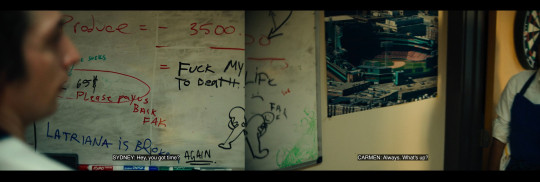
Sydney: Hey you got time?
Carmen: Always. What's up?
Similarly, we had Carmen in the first episode of season 2 making time to talk to a clearly distraught Richie:
Richie: Yo you ever think about purpose?
Carmen: I love you, but I do not have time for this, alright? *starts to walk up the stairs out of the basement*
Richie: *Nods, looks dejected, sniffs*
Carmen: I have time for this. *comes back down the stairs and sits with Richie*
Most pointedly in season 1 we had the conversation between Sydney and Carmy in 1x03 Brigade which lays the blueprint for their joint vision for the restaurant and which should have acted as a touchstone for both of them in season 3:

Sydney: You know, I think this place could be so different from all the other places we've been at. But in order for that to be true, we need to run things different.
When I said I didn't think that the brigade was a good idea, you didn't listen. And its not that you told me that I had to. [...] But you just didn't really listen and if this is going to work the way that I think we both want it to work [...] I think we should probably try to listen to each other.
Carmen: Yeah. You're right.
Sydney: The reason I'm here and not working somewhere else, or for someone else, is 'cause I think I can stand out here. I can make a difference here. We could share ideas. I could implement things that make this place better. And I don't wanna be wasting my time, working on another line or tweezing herbs on a dish that I don't care about, or running brunch, God forbid.
Carmen: *nods vigorously*
In season 2 while The Beef undergoes its facelift into The Bear, some of the show's most beautiful moments were when characters displayed their faith and trust in one another. Recall 2x01 Beef where Sydney asks Tina to be her sous chef, or 2x02 Pasta where Sydney and Carmy send Tina and Ebra to culinary school (and Tina's unwavering belief in and support for a nervous Ebra once they get there), and 2x03 Sundae and 2x04 Honeydew where we see Carmy and Sydney send Marcus to Copenhagen to stage with Chef Luca and build up his skills as a pâtissier.

So what happened at The Bear?
Season 3 of the show has been the most divisive of the series, with its preceding two seasons being almost unanimously adored by fans and critics alike. There's been a lot of debate on here and elsewhere as to why this is the case. What appears to be a dominant line of reasoning in this regard is the shift in Carmy and his approach to running The Bear as a fine dining institution.
At The Bear, we have Carmy as an Executive Chef who's berating, hostile, and blaming everyone else for his emotional state ("You guys are fucking killing me"). We have a Carmy who has taken "every second counts" to a point so minute that he has given up smoking because of the time away from the kitchen that it will cost him. We have a Carmy who has no patience for his team, almost all of whom have no experience working in fine dining before the opening night of The Bear. We see how out of sync Carmy and Sydney are ("Been off"). We have a Carmy who is reverting to patterns of behaviour that have been modelled for him by two of his abusers: his mother, Donna Berzatto and his previous boss, Chef David Fields, Executive Chef at Empire.
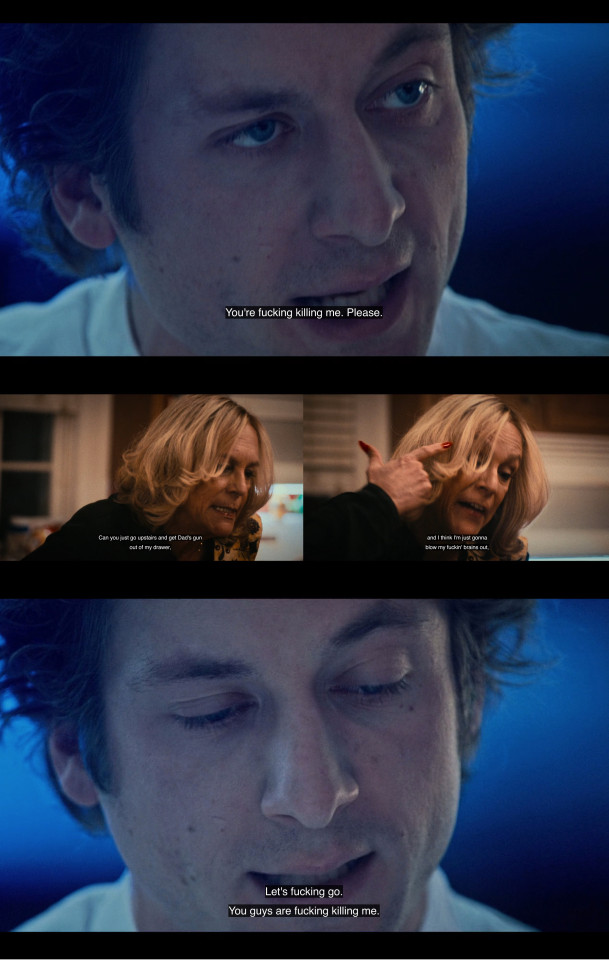
Perhaps second only to Donna and her stand in Claire, Chef David Fields' toxic legacy haunts season 3 of The Bear.
This is nowhere more clear than in the sheer wasting of food and money in season 3 epitomised by Carmy's insistence on changing the The Bear's menu every day (to quote Tina: "Every day, Joffrey Ballet?!") and his repeated throwing out of dishes he deemed "not perfect."
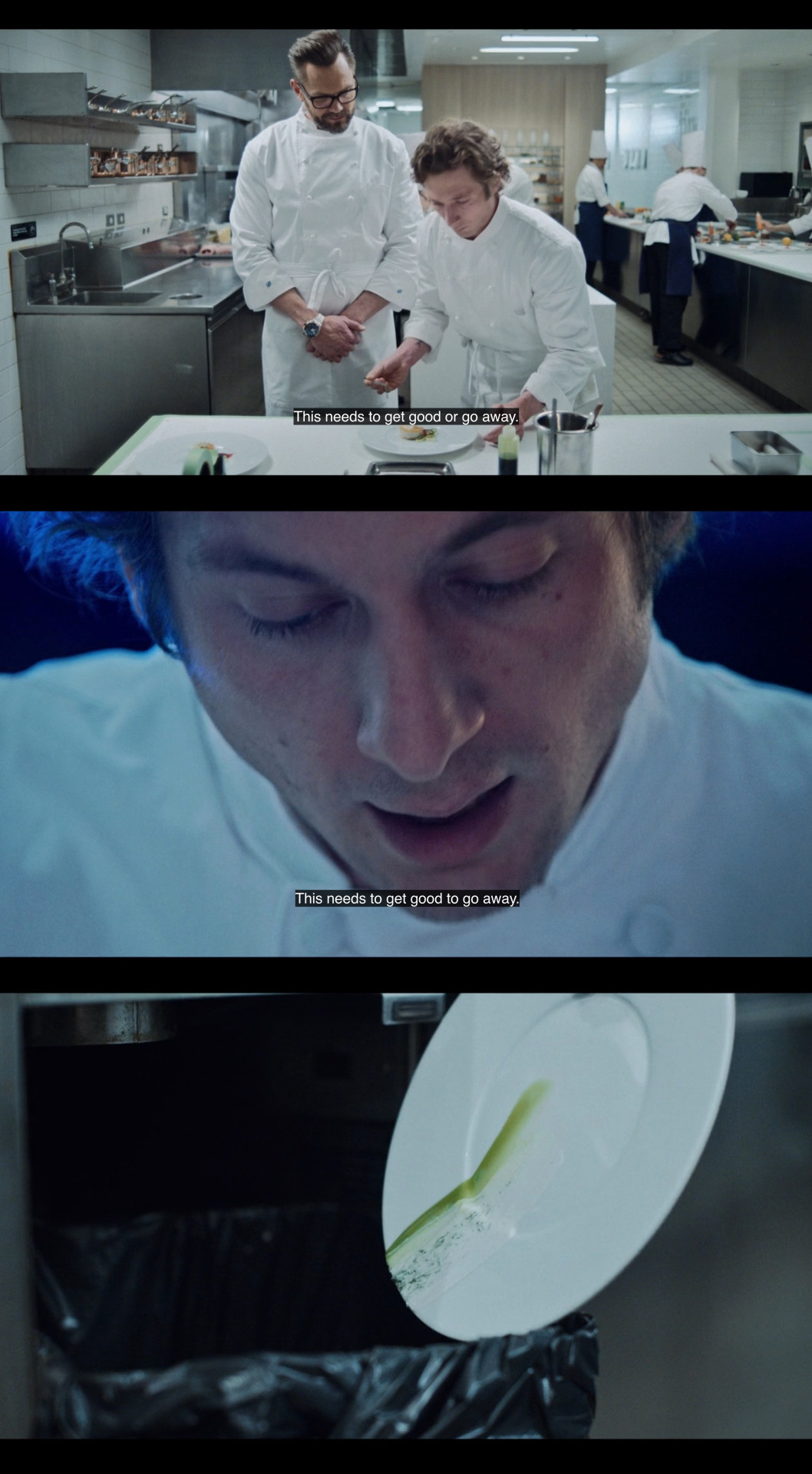
The waste did not go unnoticed by other characters on the show. Recall Natalie telling Carmy off in 3x03 Doors:
Natalie: The menu cost is out of control.
Carmen: Nat, figure it out.
Natalie: Oh. Oh. Figure it out? Wow.
Carmen: Figure it out.
Natalie: Why don't you fucking figure it out?
Carmen: I'm trying to use less shit.
Natalie: Okay, well, whatever you're doing, the R&D [research & development] of that, its fucking us.
Carmen: Well, we're using the best shit.
Natalie: Duh. Duh. Well, duh.
Carmen: Duh? Don't duh. No duh. [lmao this dialogue]
Natalie: Don't buy fucking crazy shit and then use it once, Carm. It's so wasteful. Duh! Duh, duh. Fucking duh, bro.

In episode 3x05 Children, Uncle Jimmy commissions The Computer to come in and run analytics on The Bear in an effort to get its costs under control (LOL at his assessment below, scrawled on the back of the dodgiest looking pie chart I've ever seen):

Computer: This sample is based on the month and a half we've been operating and does not take into account any funds spent previously on build, friends and family budget, other assorted fuckery.
Carmen: I mean, there hasn't been that much fuckery.
Cicero: Oh neph. You specialise in the fucking fuckery, bro.
Uncle Jimmy had plenty to say about Carmy's use of the former's funds (which Jimmy has duly invested in The Bear to support his nephew) including Carmy's decision to spend $11,268.00 on Orwellian butter (aka Dystopian Butter from the Fucking Rare Transylvanian Five-Titted Goat, lmao).
Even Carmy was under no delusions about how wasteful he was being this season. Recall his discussion with Sydney in 3x05 Children:
Sydney: You know what we should be doing?
Carmen: Produce vendor. You don't have to say it.
Sydney: Okay, I didn't say it then. I didn't say anything. Do you want me to say something?
Carmen: That I'm jamming us up 'cause we have a new menu every day and the economics aren't great?
Sydney: Well, I'm an accomplice, so...
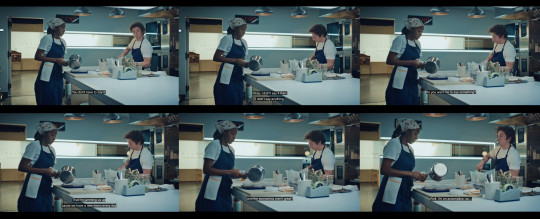
Note: the language in this small bit of dialogue struck me as being off. Why does Sydney needs Carmy's permission to say anything? Its like she knows that he knows the constantly changing menu and exorbitant expenses are an issue but doesn't want to say anything until Carmy brings it up first. @yannaryartside has a great break down drawing the analogy between Sydney's "accomplice" confession here with Molly Ringwald's (sorry I dunno what her character's name was) confession about facilitating her partner's substance abuse, during an Al-Anon meeting in 1x03 Brigade.
We have Carmy repeating harmful patterns of behaviour at work that he has picked up from his personal life (for example, from his mother) but also from his professional experience.
The world of fine dining that both Carmy and Sydney came to The Beef from was marked, by their own admission, with "complete and utter psychopaths" who screamed, pushed and yelled at their staff (recall Sydney's disclosure to Carmy at the end of 1x05 Sheridan) or "fucking assholes" (in the case of Chef David Fields), who made their staff "very, probably mentally ill." Sadly, this aspect of The Bear is not fiction. @moodyeucalyptus pointed out in this post that both Carmy and David Fields appear to have elements of their characters based off of real life fine dining wunderkind Chef Charlie Trotter: a Chicago-based chef known to be brilliant but who mistreated his staff so badly that he had two class actions brought against him (one by FOH staff, and another by BOH staff led by James Beard Award winner Beverly Kim).
There are other stories about the grinding nature of the fine dining industry which we'll get into below. We'll also look at a few stories of chefs who are leading a renaissance away from the "toxic, hierarchical shit show" that has historically plagued fine dining and who Joanna Calo and Chris Storer may have front of mind as they take us through Carmy and Sydney's journey together in season 4 (because as tempting as Shapiro's offer is, we know Sydney isn’t leaving Carmy). But first, we need to go further back in time to look at how the fine dining industry itself has created the conditions for a chef like season 3 Carmy to exist in the first place. Lets look at the system, baby (to quote Tina in 1x01).
The Bear's culinary ancestry: Chef David Fields and the Fine Dining Industry
I should say that I did not want to go too far into history with this post. After Carmen, Natalie, and the Berzattos, I was committed to trying to write shorter meta (/snort). But I'd be remiss if I didn't talk about the origins of fine dining, and before that, the rise of Europe as the base of "haute cuisine" (which itself is directly tied to its history of colonialism and...Empire *badumbum* @freedelusionshere has made the point that The Bear writers have given Chef David's restaurant the name Empire purposefully and they're not wrong). All of this informs the current state of fine dining today.
Though France is often credited as the place where restaurants began (in the 1700s), its been established that folks were eating in communal restaurant settings all over the world, including in China about 700-600 years earlier. The origins of western fine dining (the tradition that Carmy and Sydney have trained within) however, are synonymous with French cuisine and the efforts of Georges Escoffier (who Carmy name drops in 1x03 Brigade).
The French Brigade
Escoffier was responsible for developing the French Brigade system of organising kitchen staff which is still used today in many restaurants worldwide, including at The Bear. The French Brigade was based on Escoffier's own military experience in the Franco Prussian War and was set up to identify roles in the kitchen and increase efficiency and consistency so that restaurants could scale their work to serve larger numbers of customers.
The thing with anything based on structures found in the military is that its going to replicate hierarchy (a chain of command is central to the running of military operations). In fact, much of 1x03 Brigade is spent with Sydney resisting what she identifies as the imposition of a "toxic hierarchical shitshow".
Mariya Moore-Russell, the first Black woman in the world to get a Michelin star (who also happens to be from Chicago) talks at length here about the benefits of the French Brigade for systematising commercial kitchens but also how easily it can get corrupted if the wrong people are in the kitchen. She says in those circumstances, the Brigade can quickly perpetuate, racism, sexism, perfectionism and "all of the isms." My fav quote from the video? When Russell talks about the French standardisation of cooking adopted by most kitchens in fine dining industry (at 23:39):
They were like okay, how do we take what Grandma does, what Mama does and make it you know efficient and consistent but also just extremely stressful for everybody involved? (lmao)
Note: Moore-Russell has a series of videos on YouTube about her experiences in fine dining which are very illuminating. She's also such an engaging storyteller. For example, watch "My path through the restaurant industry".
Service à la française to service à la russe
In addition to the French Brigade, another development in the history of western fine dining was the shift in styles of food service from service à la française to service à la russe. Service à la française ('service in the French style') involved serving all the dishes for a meal at once, allowing patrons to serve themselves. Think something akin to buffet style. See below for table layout using service in the French style from 1775:
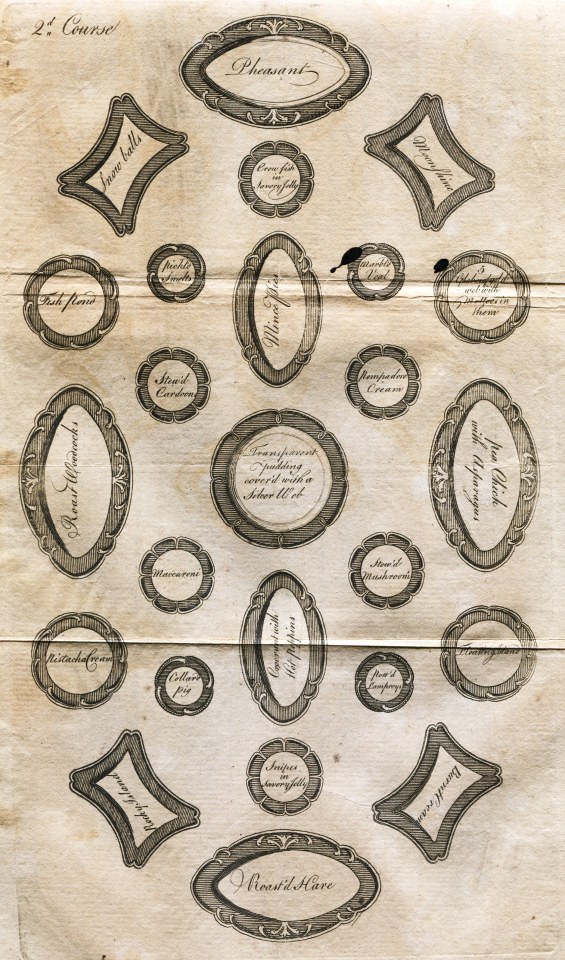
Source: Wikipedia.
To me, service in the French style looks kind of similar to how my Tamil family lays out our meals (as can be seen in the first picture of this meta, minus the pheasant, moonshine and roasted woodcocks...lol). This style of service also looks a whole lot like "family style" dining which can be described as: "when food is brought to the table on large platters or serving dishes rather than being individually plated. Guests then serve themselves from the dishes which are passed around the table." In fact, service in the French style or family style dining is how many cultures serve and eat their food, both in the home and in restaurant settings (whether they use these terms to describe that layout is another matter).
I also seem to recall a couple of soulmates Jeffreys deciding to open a family-style restaurant in 1x08 Braciole (which @bootlegramdomneess has also pointed out in her post here).

In the 19th century, service in the French style became replaced in European restaurants by service à la russe ('service in the Russian style'). This style of service is what Western fine dining and haute cuisine restaurants utilise to this day. It involves bringing courses to the dining table in sequence, one after the other. Courses are portioned and plated before being brought to the diner by service staff.
In the case of Western fine dining, Escoffier shaped haute cuisine ('high cooking') through the use of his French Brigade system and the implementation of service in the Russian style. Haute cuisine has undergone shifts and changes since the 19th century including with the nouvelle cuisine movement in the 1960s which was marked by a focus on fresh produce, paired-back menus and a focus on invention. Haute cuisine of today has been described as a fusion: employing elements of nouvelle cuisine and more elaborate techniques and processes from Escoffier's system.
To my mind, service à la russe involves a lot more people (definitely more wait staff) to have it deployed effectively. When you have more people, you have more room for error (like all those dropped dishes in season 3). Family style service or service à la française allows people to serve themselves. It encourages sharing. Personally, I prefer the latter. Also can we talk about how small the portion sizes are in haute cuisine? lmao. I get it, its art. You need a gigantic plate for a small piece of hamachi because thats the canvas. Some (read: me, lmao) might also say its big ol' waste to wash a plate that size for food that takes up maybe a 1/5 of its surface area. Can we also talk about the concept of "chargers" (which the Computer rightfully rips into Carm and Sydney for in 3x05 Children) - why do you need a table setting that no one's gonna use? I'm sure there's other aspects to haute cuisine that make no fucking sense but honestly this meta is gigantic enough as it is so I'll stop there lol.
Anyway, notably it is service à la russe and food that would be described as haute cuisine that we see at The Bear. Family style is nowhere to be seen in season 3.
Colonialism, Empire and the rise of Western food cultures
A fact that is often left out of discussions about why the French and other European countries developed such globally renowned food cultures as well as their staggering wealth and status as "first world countries" (particularly in the period between the 1600s to the 19th century) was that at around the same time, these nation states were expanding their own empires by colonising other parts of the world with the express purpose of acquiring ingredients (and other resources) that they did not have access to in Europe. A brief and non-exhaustive list of examples below:
Europe's demand for flavour was so great in the 1600s that the Dutch traded Manhattan to the British in order to secure the Indonesian island of Banda Run which, at the time, was the world's only source of nutmeg. When they first arrived in the Banda Islands, the Dutch killed and enslaved much of the Bandanese population, taking control of the island's local nutmeg plantations. This violence would come to be known locally as The Banda Massacres.
It was the hunt for a direct trade route with India for black pepper that Christopher Columbus used to pitch his voyage to the King and Queen of Spain and which ultimately led him to the Americas. Columbus' arrival precipitated the colonisation of the Americas, which resulted in enslavement, disease and outright genocide, decimating First Nations populations throughout North and South America.
The colonisation of the Americas would also lead to the exporting of various foods that have come to be staples in European cooking. For example, the tomato - the key ingredient in many Italian (and Italian American) dishes - orginated in South and Central America and was brought to Europe via Spanish colonists.
The British set up their infamously brutal East India Company (EIC) to control the Indian subcontinent and the trade of various resources including precious metals, opium, textiles (silks and cotton), spices (such as cinnamon, black pepper, nutmeg, cloves, mace) and other food items (like salt, sugar, coffee and tea). The EIC would later be supplanted by the British Raj in Britain's stranglehold on India and after almost 200 years of imperialism and economic fraud, it has been estimated that the British drained India of nearly $45 trillion. I can't even begin to fathom an amount of money that large but the British could, and that theft powered much of the empire during its height.
The influence of Indian ingredients and cuisine spread throughout the British empire, including back to Britain itself. In fact, through colonisation and empire, Indian influences appear in various global cuisines (including other European cuisines as well as in the Caribbean).
Indeed the British's impact on food globally included its colonisation of Australia and New Zealand. These two colonial outposts essentially became gigantic cattle and sheep runs for the British who facilitated the wholesale theft of land - and in the case of Australia, did so without even bothering to enter into treaties with First Nations people - in order to run livestock that was then exported to feed Britain.
In order to satisfy its sweet tooth, France operated huge sugar plantations on the backs of the labour of enslaved Africans, particularly in Haiti (known at the time as Saint-Domingue). In the late 1700s, Haiti was responsible for exporting 40% of all the sugar consumed in Europe. The human cost of this was high and brutally violent. Eventually in 1803, after many armed revolts, enslaved African-descent people kicked the French out of the country after over a hundred years of heinous exploitation (thereby creating the first Black republic in the world). The French were so economically dependent on the colony for its production of coffee and sugar that when Haiti got its independence, France decided to punish the new republic for the loss of future income on Haitian exports, demanding 150 million francs in gold as compensation. The French sent warships to enforce this cruel debt. All in all, Haiti spent approximately $21 billion paying off France for the freedom that its people had already lost their lives and shed their own blood for. The debt (which involved the fledgling republic taking out exorbitant loans and fundraising amongst its citizens) was not paid off until 1947: 122 years after it was initially enforced. The French even charged Haiti interest.
Were it not for its vicious history of slavery and its century-long extortion of its former colony, I'm pretty sure France wouldn't have had the quantities of a certain key ingredient necessary to develop its worldwide reputation for pastries and desserts. I mean, you try making a crème brûlée, an eclair, a tarte tatin, a sweet galette, a mille-feuille, a madeleine, a crepe...without sugar.
This history deeply informs fine dining today. For centuries, Europe underdeveloped much of the world (borrowing Walter Rodney's turn of phrase) through colonialism and imperialist extraction. It then used those spoils and excess wealth to, among other things, develop its own food cultures and then self-proclaim itself as the cutting edge of the culinary world. To be clear, you can only faff about in a kitchen and create fancy sugar palaces and 10-course meals if you have the means and resources to do so. Haute cuisine is a product of wealth and resources, accumulated over time. Europe's colonial history also dictates which cuisines are recognised via awards like the Michelin star system. Hell, it dictates why you have the French (Michelin is a French tire company) dictating what constitutes "good" food in the first place. If you want to read more about this topic, this essay on Medium provides a good overview of the sad, racist state of affairs over at the Michelin Guide.
Where Europeans colonised and settled, this same lens was applied. This is why you have the undervaluing of Indigenous cuisine and ingredients in Australia, a situation which has only recently begun to shift. The colonisation of Australia actively involved the lying about Aboriginal foodways in Britain's attempt to falsely claim that Aboriginal peoples were nomadic hunter gatherers who did not use their land. Its why the history of how enslaved Africans brought their food cultures with them through the Door of No Return and transformed American cuisine, is not more widely known. Its why so few chefs of colour have been recognised for Michelin stars globally.
Empire and The Bear
Season 3 of The Bear pays clear homage to the impact of European empire on the world of fine dining in a few ways. The most obvious is the fact that Chef David's restaurant is literally called "Empire" lol. Another example and one of the most visually striking to me occurs in 3x01 Tomorrow. First, recall Chef David Fields' outright theft of Carmy's dish (I think we've established that you can't get more empire than the theft of food, yes?). Can we talk about how not only did Fields steal Carmy's dish but also, turned it into the most beige meal we've seen on The Bear to date, bar that single sprig of dill fighting for its life?
Carmy's penultimate plate (the final version being The Best Meal That Sydney Ever Had™):
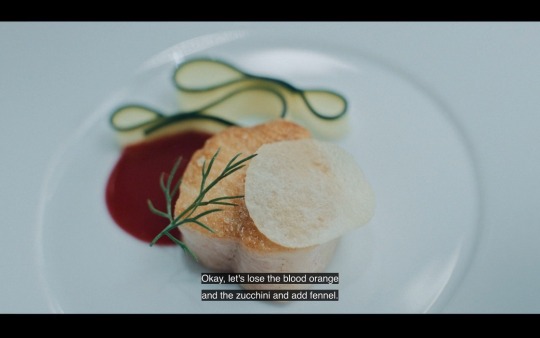
Chef David Fields' dick measuring exercise version:
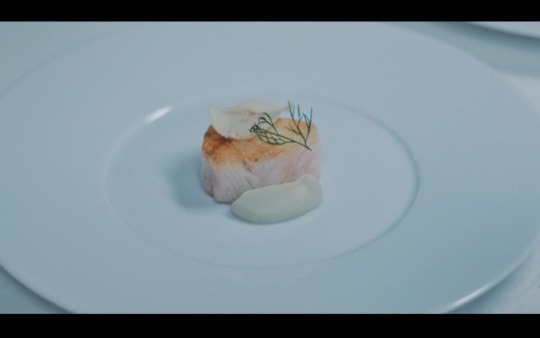
Carm was not a fan:

Can we talk about how the original plate featured the colours of the Italian flag (green, white and red) - emblematic of Carmy's cultural heritage and what is certainly one of the single biggest influences in his culinary journey (the dish also features fish, just like the main course in La Vigilia, the Feast of the Seven Fishes) - but after Fields was done with it, that shit was practically three shades of mayonnaise?
Can we talk about how Carmy's version of the dish almost certainly had a varied and dynamic flavour profile while Fields' looks just how I imagine it tasted like: whatever flavour meh is. The dish literally has no acid from what I can see (ingredients: paupiette of hamachi, fennel soubise, potato chip and dill). And I *know* a balanced dish has salt, fat, acid and heat (cos Chef Samin Nusrat told me).
Can we also talk about how Fields hates the most commonly traded of spices? The one that Columbus was looking for when he landed at what is now the Bahamas. The one that was an integral part of the East India Company's business plan rort to fuck India and South East Asia more generally?
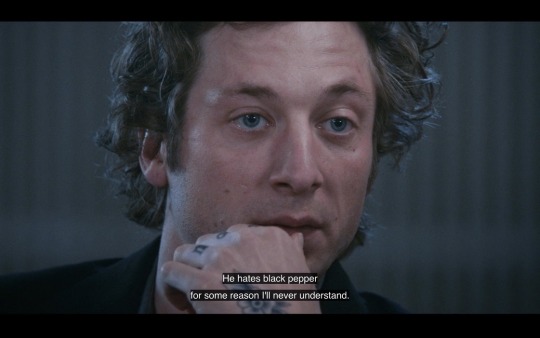
Carmen: He hates black pepper for some reason I'll never understand. (from 3x10 Forever)
White folks in Europe were so hungry for spices to liven up their food that they invaded large swathes of the rest of the world to get the stuff. And yet, here we have Chef Fields, disliking Europe's gateway spice: the one that the Romans (Carmy's ancestors) had been trading with the East for centuries prior to Europe’s imperial frenzy, and which now makes up 20% of the world's spice trade.
Is the man so dedicated to meh that he couldn’t even bring himself to embrace pepper? Used to be one of the best chefs in the world, is right Chef Luca.
On top of dubious taste (I'm not a food critic but no one can tell me that hamachi and fennel soubise dish tasted anything other than fucked lmao. idc idc), Chef Fields is also one of the clear antagonists in The Bear. Along with Donna Berzatto, he is one of Carmy's two primary abusers. His impact on Carmy was never as clear on the show as it was in season 3. Lets take a closer look at that impact below:
Culinary ancestry and intergenerational trauma
Both Donna and David are ancestors of a kind to Carmy. Donna is clearly a biological ancestor in that she's Carmy's birth mother. I've argued here that David Fields is a culinary ancestor to Carmy. For ease of reference, I'll include my explanation of what I mean when I say "culinary ancestry", from that earlier meta, here:
Most folks understand ancestry to refer to our family or genetic lineage. When I was in university, I learned about intellectual ancestors or genealogy: where one can trace your intellectual lineage - the thinkers and creators that have shaped your understanding of the world and/or your chosen profession. I think its useful to take this concept and apply it to The Bear to help understand what the show is saying about legacy. I wouldn't limit the concept to "intellectual" ancestry though. It might be more helpful to talk about culinary ancestors in this context because the process of creating food - crafting dishes - isn't solely an intellectual exercise. It engages our intellect yes, but also each of our senses, our memories (recall that chocolate banana from 2x10 The Bear), and the need to nurture and be nurtured. Culinary Ancestors Carmy's culinary ancestors are varied given his work history. We know he's cooked under some of the best chefs in the culinary world of The Bear, including: Daniel Boulud (of Daniel), René Redzepi (of NOMA), Thomas Keller (of The French Laundry), David Field (a sociopathic Joel McHale, of Eleven Madison Park Empire), and Andrea Terry (a sublime Olivia Colman, of Ever). I'd also include here Mikey, Donna and Natalie Berzatto. I'd include cousins Richie Jeremovich and Michelle Berzatto as well. These are the home and line cooks Carm grew up with, watched in his mother's kitchen and at The Beef. He took his lessons - the good and the bad, learnt voluntarily and involuntarily - from all of these people, incorporated them into his working self and transmuted them into his food.
NOTE: In "Ancestors and The Bear" and in other meta I've written, I've incorrectly noted that Chef David Fields was the EC at Eleven Madison Park (instead of Empire). This was due to the fact that up until 3x10 Forever, we are not told the name of the restaurant that Fields and Carmy worked at together. In the draft script for the pilot, the restaurant is identified as EMP (Eleven Madison Park) by Sugar (see p 23 of that script), however this appears to have changed to "Empire" during the course of the show's development.
Through the lens of culinary ancestry, there is a clear connection between Carmy's wasteful R&D and menu choices in season 3 with the "lessons" he received under the tutelage of Chef David at Empire. For example, and as discussed above, the refusal to serve any dish that isn't viewed as "perfect" led to extreme amounts of waste at both The Bear and at Empire.
Additionally, Chef David focused on "subtraction" (recall his writing "SUBTRACT" on green tape and sticking it to the expo of Empire in 3x01 Tomorrow) and never repeating ingredients in the dishes that came out of Empire. Instinctually, these two strategies appear to me to be techniques to create needless scarcity. They're attempts at repression in and of themselves. Carmy adopts these philosophies and tries to implement them at The Bear as well. They manifest in his unilaterally overhauling the original menu at The Bear (without Syd's input) as well as his insistence that the menu change every day.
Minimalistic subtraction of elements was also a characteristic of Escoffier's approach to cooking which would be taken even further with the nouvelle cuisine movement in France. That movement focused on minimalistic dishes with fewer seasonings and sauces. Chef David Fields is clearly rooted in the French school of fine dining in this approach.
Subtraction also shows up in the show in a more dire way: in the cutting off of relationships and the whittling away of self.
I recently come across a promo still for The Bear. It features Carmy as the CDC of Empire, plating a dish. I've seen the image before but I never noticed the writing on the wall next to Carmy before. It reads:
"Its only after we've lost everything we're free to do anything"
This quote also appears in the 1999 David Fincher film, Fight Club (which itself is based on the book by the same name by Chuck Palahniuk):

Left: Carmen Berzatto, CDC at Empire in The Bear; right: Tyler Durden, general nihilistic fuckwit in Fight Club, also preaching the gospel of David [Fields].
This ethos, written on the wall and haunting the kitchen at Empire is emblematic of how Chef David operates. It reads like a fucked Psalm, giving a poetic shimmer to Field's abuse. Chef David tears down his staff, verbally degrading them to the point that he has the gall to whisper "you should be dead" to them. (OK. Can we...for a minute...imagine being a manager and that being your management style? Telling your best performing staff that they should be dead? Excuse me, mon cheri? A literal devil).
Chef David literally strips his staff of their dignity and their connections to the outside world. He makes them lose their sense of self and claims its all to make them better chefs. He tells Carmen in 3x10 Forever:
Chef David: So you got rid of all the bullshit, and you concentrated, and you got focused, and you got great. You got excellent.
The parallels between Carmy's experience at Empire - and even in the Berzatto household - and the critique of performative violent masculinity that Fight Club was trying to get across are worth pointing out. In Fight Club, white men beat each other up to try and assert control over a perceived loss of power. At Empire, Chef Fields consistently berates and degrades Carmy, clearly threatened by his CDC's talent. Similarly we have Richie complaining about having to take orders from "toddler" Carmy, saying "I was a baby too once, Syd. Nobody gave a fuck" in 1x02 (which could have been the origin story of any one of the men who joined Brad Pitt/Edward Norton to carry out "Project Mayhem" lmao. In fact, I wouldn't be surprised if a lot of the dudes on Reddit fawning over Richie circa seasons 1-2 also watch Fight Club as if it was some sort of aspirational manifesto and not the satire that Fincher intended it to be).
Chef Fields is meant to be representative of a toxicity found in the restaurant industry globally. There have been numerous reports of the physical and psychological violence meted out against kitchen staff by those higher up in the brigade.
Additionally the structure of the French Brigade system is such that those at the bottom - stages - are often expected to work for free. While unpaid internships are common in various lines of work, those industries start to run into trouble when large amounts of their products and services depend on unpaid labour. In fact, darling of The Bear, René Redzepi of Noma faced criticism of his restaurant's unpaid internship program. The internship program was rife with stories of ridiculous working conditions. Redzepi finally began paying interns in 2022 but then announced that Noma would shut down regular service at the end of 2024 due to being unable to afford its staff (at one point, unpaid stages made up almost half of Noma's staff).
The fact that entry into the world of fine dining means people need to work for free as a stage automatically eliminates this as an option for folks who cannot afford to volunteer in order to gain work experience. This would disproportionately impact on certain communities, particularly communities of colour whose members may not have access to sufficient wealth that would allow them to work for free. This is clearly illustrated in The Bear where we see that Carmy has the safety nets and access in place that allow him to stage at various fine dining institutions and gain much sought after experience (e.g. his family's ownership of The Beef and his ability to work there, his cousin Michelle's restaurants in NYC and his access to those spaces). Sydney, Tina, Marcus and even Richie have very different entries into the world of restaurants and fine dining.
The issue of sexual abuse and harassment in the restaurant industry is also very subtly broached in The Bear (though it is more heavily implied in the draft script for 1x01), particularly in 1x07 The Review with Richie accusing Sydney of giving a food critic head in order to get a positive review for her risotto (season 1 Richie was genuinely the worst). But the issue is huge, with more sexual harassment claims filed in the US in the restaurant industry than any other field of work.
Even scrubbing floors by hand and cleaning with a toothbrush, while ensuring sparkling kitchens, have also historically been used as a means of punishment, particularly in institutional settings. During Australia's Royal Commission into Institutional Responses to Child Sexual Abuse, there were numerous reports of children in care homes being forced to scrub floors with toothbrushes as a means of physical punishment and control. (CW: the above link discusses accounts of institutional child sexual abuse).
Given the above, its clear to see that the industry - the system - facilitates a whole lot of shit that its workers are subjected to. So when Chef Adam Shapiro catches Sydney as she leaves the train station in 2x04 Violet and asks her how she's doing, her response is telling:
Sydney: It's been a long month [at The Bear].
Chef Adam: Ah. That bad?
Sydney: No, just-- Restaurants.
Chef Adam: Yeah. Right? Why do we do this to ourselves?
Sydney: 'Cause we're crazy.
Chef Adam: Yeah. What was this month's crazy?
Sydney: Um. The kind that's inherited.
Chef Adam: *Nods emphatically* Understood.
This Financial Times article on the dark side of restaurant culture in Copenhagen, sums things up perfectly:
“We always had this joke, an explanation for why things are so horrible: shit falls down,” [Chef Levi] Luna told [the author Imogen West-Knights], with a cold laugh. In the kitchen, the head chef gets mad at the sous-chef, who gets mad at the person below him, a chef-de-partie, who then takes it out on a stagiaire. Then one day, the sous-chef is the head chef, and he has learnt how a head chef behaves: badly. It should give a sense of the strength of feeling I encountered about how damaging this system is that several people independently described it as being like children who are abused going on to commit abuse as adults. This is the dark flipside of the restaurant-as-family metaphor.
Challenging the status quo @ The Bear
By the end of season 3, Carmy appears to recognise that subtraction in his life is not going to bring him happiness. In fact, in 1x08 Braciole, he identified subtraction - specifically, the cutting out of people from his life - as the reason his life got quiet as he grew more isolated. In 3x10 Forever, when he finally confronts Chef David, Carmy laments the psychic and physical impact of Fields' abuse as well as the isolation it engendered. Fields, psychopath that he is, remained unfazed:
Carmen: You gave me ulcers, and panic attacks, and-and nightmares. You--You know that, right? Do you-- Do you understand that?
Chef David: Yeah, I gave you confidence, and leadership, and ability. It fucking worked.
Carmen: My life stopped.
Chef David: That's the point, right?
Additionally, its worth pointing out that despite all the focus on precision, minimalism and (quite frankly) rage being put into the impeccably plated dishes of The Bear, it's the messy, juicy, multi-ingredient filled Italian beef sandwiches that remain the site's best seller. Indeed, in 3x05 Children, Nat tells Carmy that the sandwich window is the only thing at The Bear making any money. So much for subtraction.
We also see Carmy resisting a total acquiescence to Chef David's approach to running a kitchen early on in season 3. His non-negotiables read in the hindsight of the entirety of the series like his attempt at integrating the lessons he’s learned from various kitchens. It’s why the list says “no repeat ingredients” AND “vibrant collaboration”. We know that vibrant collaboration had to come from someone else’s kitchen cos Fields certainly wasn’t collaborating with anyone. That asshole was out there dictating like a fascist.
Additionally, while Carmy has realised the dangers of the fine dining industry by the end of season 3 (and not for the first time - recall in 2x01 The Beef when he called the Michelin star system "a trap"), and while Sydney grapples with her role as an "accomplice" to Carmy's season 3 bullshit, their protégés Tina and Marcus continue to keep the flame of genuine care, collaboration and inspiration alive. This is most clearly seen during the conversation Tina and Marcus have in 3x09 Apologies where they discuss Marcus' mother and his memories of her as well as brainstorm ideas for Tina's cauliflower, brussel sprouts and horseradish dish (please for the love of gad, give us more Tina, Marcus and Ebra next season).
Challenging the status quo in the real world
There are also actual chefs in the real world who appear to be doing something different with their work: embracing their own food cultures that have historically been locked out of the world of fine dining and also trying to run their kitchens in more egalitarian ways.
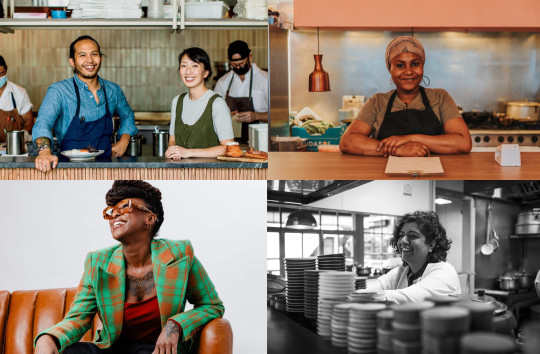
Above clockwise from top left: Chefs Tim Flores and Genie Kwon of Kasama, Chef Adejoké Bakare of Chishuru, Chef Asma Khan of Darjeeling Express and Chef Mariya Moore-Russell formerly of Kumiko and Kikkō.
The first, most obvious example of this for The Bear fans is Kasama, (shout out to @currymanganese and @thoughtfulchaos773 for introducing me to the above linked, short doco) the Filipino American restaurant founded and run by Chefs Tim Flores and Genie Kwon (who also happen to be married) in Chicago. Kasama is also where Carmy and Syd were meant to have their palate cleansing "reset" in 2x03 Sundae and where Sydney may have also been hit on by fellow Coach K fan, Kasama bae (shout out to @sydcarmyfan for verbalising what I squee-ed about on first watch of this episode lmao).
Both Flores and Kwon come from fine dining backgrounds but appear to challenge some of that industry's basic tenets, including the messianic role of the EC as top of Escoffier's brigade food chain. Flores openly states that his cooking is an ode to his Filipino mother who regularly taste tests his food. In the Nick Cavalier doco linked above, Flores states "if [his mother Lolly Flores] eats [the food] and there's no reference to her dish at all, I'm not doing the right thing." Flores and Kwon also operate Kasama using a hybrid model (that I think would send regimental Escoffier into a tailspin) where they offer fast and casual service featuring Kwon's baked goods during the day and offer a Filipino tasting menu led by Flores for dinner service only. Kasama was awarded a Michelin star in 2023, the first Filipino restaurant in the world to achieve that title. It also took home a James Beard Award that same year.
Note: if you haven't already, have a read of this interview of Tim Flores and Genie Kwon conducted by the Michelin Guide. ISTG Storer and Calo have read this and lifted whole paragraphs for The Bear's script. An excerpt that stood out to me, in particular:
The two first met at Bib Gourmand restaurant GT Fish & Oyster, also in Chicago. "He was leaving as I was starting. So we didn't overlap for very long. But I actually went to eat at the restaurant that he was working at afterwards, and I had one of the best experiences of my life at a tasting menu. And after that we started talking and hanging out, and eventually started dating," recalls Kwon about how she and Flores first met.
Sounds a lot like a couple of Jeffs we know, yes?
Also check out Chef Adejoké Bakare, who in 2024, became only the second Black woman to get a Michelin star in the world (the first being Chicagoan Mariya Moore-Russell who announced in 2020 that she was taking a break from her career for her mental and physical wellbeing and who also...is married to a chef lol). Bakare's restaurant, Chishuru in London, specialises in West African cuisine rooted in Bakare's Yoruba, Igbo and Hausa cultures. Bakare, like Genie Kwon, has a background in biological sciences. She also began her career as a home cook, then ran a fish and chip cart while studying at university in Nigeria. Once she moved to the UK, she ran a supper club and later won the opportunity to run a short term pop up restaurant. During the ceremony where she got her Michelin star, Bakare noted "[i]t did feel rather odd at last night's ceremony that 90% of the room was white middle-aged men. But the passion I see among young women in the industry is such that I'm confident things will change."
Take also Chef Asma Khan, who got her start in the industry as a home cook and then began running supper clubs out of her house in the UK. She then opened up the Darjeeling Express with a group of South Asian women she had met when they were all fairly recent arrivals in the UK, none of whom had formal culinary training. To this day, her kitchen remains fully staffed and run by women.
In this TEDx Talk about her work, Khan says:
"I wanted to cook but I actually wanted to feed people. This gave me the greatest pleasure. I felt at my most powerful when I was able to serve someone something I had cooked. In some ways it was my way of showing affection and love, and being able to give them something that took them home."
Sounds familiar yes? Like a couple of Jeffreys in season 1 of a certain show?
About the systemic sexism in the industry, Khan says:
"But at that time, in England, anywhere in the West, everywhere you looked it was male chefs you saw that was on television [...] in the media. It was always about men who were cooking kitchens. The greatest irony of it all is that [...] in every South Asian home you go to, you will invariably find a woman [cooking] but in every South Asian restaurant you go to, not just in India but in Pakistan, Bangladesh, Sri Lanka, almost everywhere in the world, you will usually find a man cooking in the kitchen. And it was a desire for me that I wanted to cook but there was no road or route in front of me."
Khan elaborates further on the skewed and gendered manner in which elite fine dining operates, in this article:
“There is no public hanging [in her restaurant]. Male chefs have made cooking into a combat sport. I think it’s a reaction to the idea that cooking is feminine: I’m not the dinner lady! I’m not your grandmother! Sorry, but if you’re constantly screaming at staff it means you’ve trained them badly.”
Khan is describing the hyper-competitive nature of fine dining (and her suspicion that in a highly gendered industry that is populated by majority men, that there is a need to perform a hypermasculinity in order to put distance between themselves and the historically feminine-gendered roots of the act of cooking) and how Khan wanted no part of it, for herself, her staff or her patrons. In this Guardian article, Khan points her attention directly at the toxic work cultures of many fine dining institutions:
Khan sees herself as a vital heckler on the sidelines of the industry, rather than part of its elite club of star chefs. She is especially scathing of a macho restaurant culture that has allowed workplace bullying and abuse to become normalised – and of those who enable it.
“My deep concern during the pandemic is seeing very prominent people with considerable wealth remove the entire workforce without a safety net.” A surge of restaurant and pub workers were reported to be sleeping rough in central London in April, a fact Khan can’t shake. “It is so shameful, my heart bleeds for the industry, it is immoral. I don’t want restaurants to be ranked by Michelin stars for the fluff and edible herbs they put on a plate. I want to know how they treat their people, they should be ranked on that. Where there is bullying and racism, where there is sexual harassment, where staff don’t feel safe, people should boycott those restaurants. I don’t want to see them prosper.”
Honestly, after reading some of the horror stories about work place practices in the restaurant industry, I'm with Khan. I'm also with Flores, Kwon, Bakare and Moore-Russell. I reckon Storer and Calo are also with these folks too and that we're going to see a shift in season 4 of The Bear that reflects the larger industrial change in the world of fine dining that chefs like these are heralding.
The death of fine dining
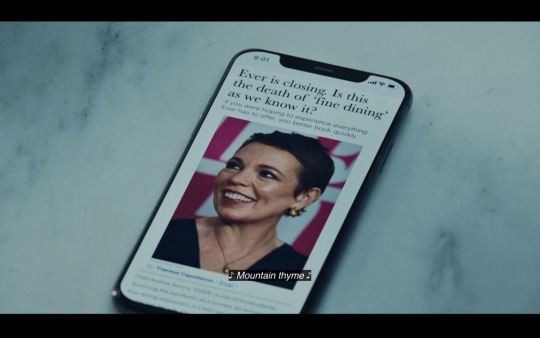
Above: Carmy's phone in 3x05 Children
Like @freedelusionshere says here, I don't think its a suprise that season 3 ended with Ever's funeral. The fine dining of Empire and even Ever is dead. How can it not be given the way its been largely running to date, as discussed above? How can it not be when we are living in a time of severe food insecurity precipitated by runaway consumerism and the twin existential threats of global climate and extinction crises. How can anyone in good conscience justify charging exorbitant amounts of money on a plate that is not going to fill patron's bellies while there are communities worldwide who do not have enough food to feed their children? When some communities, even in so-called "first world" countries like America and Australia cannot access clean drinking water?
Truly, the argument for fine dining posited by Will Guidara in 3x10 Forever made me (and I'm sure many others) actually cringe.
There's nobility in this. [...] We can give them the grace, if only for a few hours, to forget about their most difficult moments. Like, we can make the world a nicer place. All of us in this room. We have this opportunity, perhaps even a responsibility, to create our own little magical worlds in a world that is increasingly in need of a little more magic.
There *is* nobility in nurturing people, in feeding them. But in a time of the multiple and rolling, global existential crises, where particular communities are being targeted not just for marginalisation but whole scale eradication, this is not a time for more "magic"; particularly when those "little magical worlds" are reserved for the select few who can afford them. We don't need more holes to bury our heads in. We need real spaces of care that are accessible, kind (read: not nice, but kind. there is a big difference) and nurturing. And those spaces need to be those things not just for the patrons who visit them but also for the staff who work there.
There is also literally no time for escapism, at least not of the kind that late stage capitalism promotes and as described by Guidara in 3x10. We are living at a time where food systems are said to make up one third of all greenhouse gas emissions, pushing the climate crisis further to the point of no return. What's the point of making magic worlds to escape an actual world on the brink? And while your magic-making contributes to the brink getting closer? Its like putting lipstick on a pig.
Indeed some have posited that it was the British Empire's remaking of the world to feed Britain (which we've looked at briefly above) that has been the single biggest contributor to the current environmental crises facing our planet. The Bear acknowledges the issue as well. Recall 2x04 Violet when Tina visits Jerry at the farmers' market and his explanation for why he has so little produce to sell:
Jerry: There's fewer and fewer moths to grow vegetables now, and 'cause of that, there's fewer and fewer farms. Used to be you could come down here, buy everything you needed for a full menu. All in one spot. Whatever grows together, goes together.
The reason there are fewer months to grow vegetables is because of climate change which has impacted on everything to season length, groundwater and rainfall levels (as the two main sources for global farming irrigation) and increased periods of drought and heatwave.
So whats next for The Bear?
Season 3 put us through the ringer with Carmy replicating toxic practices in his restaurant that are rife in the industry at large. Yes, Carmy also has mental health issues and is a survivor of multiple sources of trauma. We know this. I've talked about this at length here and here. But he's also a guy who's running his own business with folks who are dependent on their place of work for their livelihoods. As such, he, Nat and Uncle Jimmy (as co-owners of The Bear) have responsibilities to their staff.
As EC at The Bear who is directly responsible for managing BOH, Carmy has a choice to make about whether he "blows his trauma through" (shout out to Dr Resmaa Menakem and his book My Grandmother's Hands) the bodies of those closest to him, including the crew at The Bear. Just as parents have to work on themselves so that they don't replicate harmful patterns of behaviour in raising their children, so too do we all in our daily relationships, including where many of us adults spend most of our waking lives: at work.
Like Richie observed, Carmy is not integrated in season 3 but neither is the industry in which he's working. A menu that constantly changes, wasteful food practices, a food production and agricultural industry that contributes to a third of global greenhouse gas emissions leading to increased global warming. These things are absolutely not integrated. In many ways, Carmy's mental state in season 3 - anxious, agitated, exhausted, is a reflection of the times. Given all of the above, Carmy's "I'm so fucking sick of this" in 3x09 Apologies hits me harder in the chest. Yes Carmy, you should be. Now go do something about it.
Having looked at the career trajectories of a few talented, conscientious chefs in the course of writing this meta, I think its pretty clear that the old way of running restaurants a la Chef David Fields is over. As we sit at the precipice of climate disaster, watching multiple genocides unfolding at once, during a time of massive food insecurity, who the hell has time to be suffering in the way Chef David made his employees feel in the course of making food that is meant to nourish people? What fucking cognitive dissonance is required to continue on THAT kind of a path?
Come season 4, I reckon we are going to see a massive shift in the trajectory of The Bear. This will be precipitated by multiple things (like the review Carmy got at the end of 3x10 and whatever the fuck Uncle Jimmy is up to with that box and those golf clubs lol) but most significantly, by a realisation on Carmy's part that his version of Michelin mode IS NOT IT.
I reckon Carmy and Sydney are going to continue to work together but they'll go back to the original plan they made with one another in 1x08 Braciole. They're going to go back to family style. They're going to treat their staff better (after Carmy apologises lol). They're going to shift from wasteful, haute cuisine to sustainable food practices that support producers and the planet more broadly. They're going to leave Chef David Fields' scare tactic of subtraction behind and lean into using more pepper.
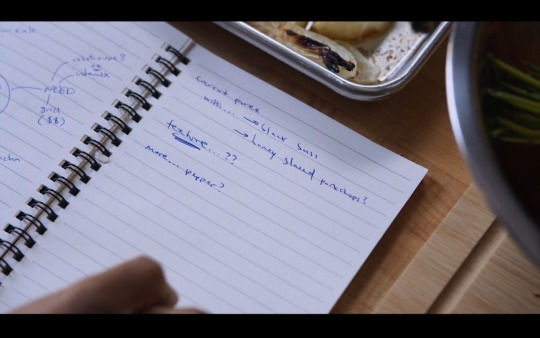
Above: Sydney's notebook as she workshops a recipe at home in 1x08 Braciole.
Tagging: @moodyeucalyptus @currymanganese @hwere @freedelusionshere @thoughtfulchaos773 @ambeauty @brokenwinebox @devisrina @espumado @fresaton @kdbleu @vacationship @birdiebats @bootlegramdomneess @mitocamdria @tvfantic87 @angelica4equity @anxietycroissant @turbulenthandholding @yannaryartside @afrofairysblog @ciaomarie
cos you may be interested but as always, I'd love to chat to whoever wants to about this stuff!
#my next meta will not be nearly as long as this...i hope.#this one took months lmao#just in time for the end of#sydcarmyweek2024#sydcarmy week 2024#the bear#the bear fx#the bear hulu#the bear meta#sydcarmy#carmen berzatto#sydney adamu#the bear season 3#mariya russell#asma khan#kasama#adejoke bakare#genie kwon#tim flores#chishuru#darjeeling express#good luck at the emmys bear crew!
123 notes
·
View notes
Text
Today is Holocaust Remembrance Day. This whole week l have been thinking alot about the Holocaust. So last night I re-read maus. One panel really stuck out to me during this reading. For context this is in Maus 2 when Art is talking to his therapist, a Holocaust survivor, about how he feels he could never measure up to his father who survived Auschwitz. At this point in the story his father had already past. May his memory be a blessing.
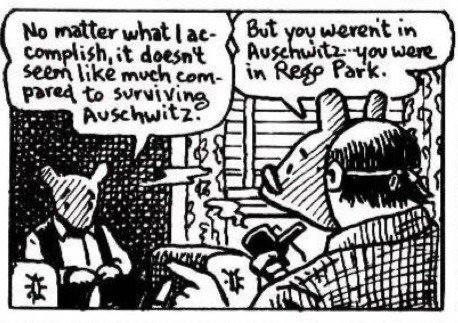
The dialogue, “but you weren’t in Auschwitz. You were in Rego Park,” hit me like a punch to the chest. I have no better way to explain the paradoxical guilt I felt and continue to feel as the granddaughter of a Holocaust survivor. I did not live during the Holocaust. It had ended before my grandmother reached eighteen years old. And yet, the Shoah seems to loom over me. Forever a reminder, that I am alive by sheer luck. My great grandfather’s parents as well as two of his brothers were murdered in Auschwitz. My great grandmother’s twin sister was also murdered in the Holocaust. Despite hours of research, I still have no idea where exactly she died.
Using the term guilty for what I feel doesn’t seem exactly right but there is no better word in the English language. Maybe if I was smarter or more articulate I could find better words.
A key theme of this chapter is intergenerational trauma. This is the same chapter that has this iconic image.
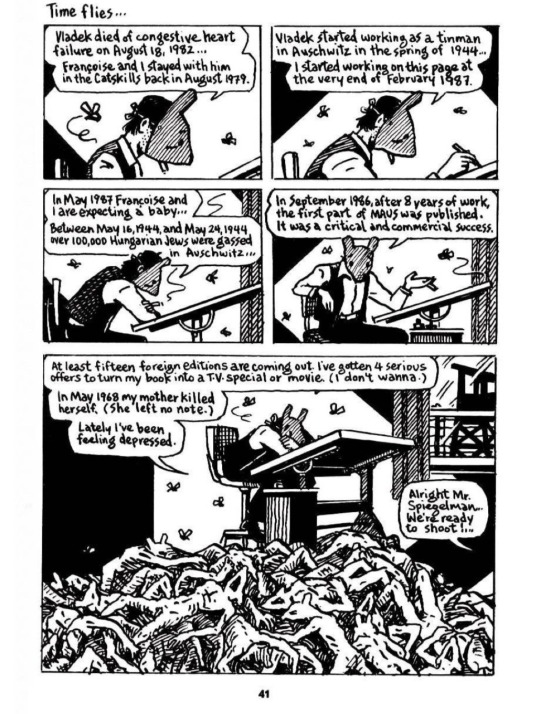
On this Holocaust Remembrance Day, I simply want to acknowledge the real and extremely painful intergenerational trauma and inherited survivors guilt felt by descendants of Jewish survivors. I know I struggled in the past with feeling like I even have any right to feel this way considering I am three generations removed from any of my family that were murdered in the Holocaust. If any other Jews struggle with thoughts like this, I want to assure you that your feelings are valid and real. Intergenerational trauma is complicated and the feelings that come with it don’t simply disappear once a certain number of generations from the event pass.
This post is specifically about the Holocaust and jewish intergenerational trauma stemming from our persecution and genocide. If this post resonates with you as a non-Jew who has intergenerational trauma I am glad, but please do not derail this post.
#history#holocaust remembrance day#holocaust#shoah#intergenerational trauma#jumblr#jewish history#shoah mention#tw shoah#holocaust mention#tw holocaust#judaism#maus#antisemitism#jewish trauma#survivors guilt#mental health
177 notes
·
View notes
Text
Intergenerational Trauma Challenge - 180 Degree Longitude Passes Through Us
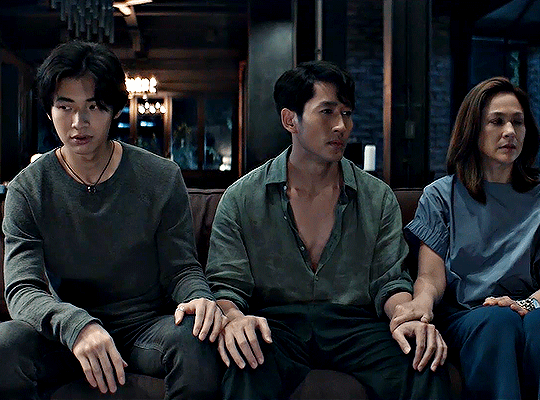
It’s winter and I’m huddled up in my house hiding from the cold weather, so obviously this is the perfect time to tackle another entry on the intergenerational family trauma challenge list. This week I finally watched 180 Degree Longitude Passes Through Us, a Thai drama about Wang, a young man just coming of age who is desperately seeking answers about his father’s death; Sasiwimol, Wang’s very complicated mother who does not want to dig up the past; Inthawut, his father’s best friend who has been hiding from it for years; and Siam, the black hole at the center of this story.
Before I dig into the trauma themes, let me just say that this show is excellent, if not for everyone. It has a very intentional style that makes it feel like a stage play—the writer is a playwright—and it’s basically eight episodes of very intense conversations. It’s not a romance and there’s an intellectualism in the writing that I found kept me at an emotional remove from the characters even as I marveled at how well crafted the dialogue is. And the dialogue is very important, which is why the translation of this drama is much stronger than we typically get from Thai productions—the words matter. It’s also loaded with visual metaphors and is all around beautiful to look at, and the three main performers are fantastic. I highly recommend it to anyone who likes theater, stories about complicated families, or beautiful and talented actors showing their work. And more than anything else, this show does incredibly strong thematic work and its messaging is on point: this is a story about how noble idiocy ruins lives.
So, with that said, onto the trauma! Spoilers ahead, and I am assuming anyone reading past this point has watched the show. Some themes you’ll see in this one: taboo, denial of queer identity, homophobia, filial piety, and lots of emotional manipulation. Shoutout to @bengiyo and @twig-tea for reading this to make sure I didn’t miss anything in this complex story.

There are two main sources of intergenerational trauma radiating down toward Wang: the absence of his father, Siam, and his intense relationship with his mercurial mother, Sasiwimol. The story is structured around Wang’s determination to seek answers about Siam—both who he was and how he died. He has grown up knowing a certain story: that his parents met and fell in love in college but divorced when he was young, that his father loved him very much despite not staying with his mother, and that his father was an alcoholic who died in a drunk driving accident. Shortly after his father’s death, his mom put him in boarding school so she could focus on her career and became a weekend parent to him—as she was not around to structure his day to day life, their relationship became more about her taking him on fun adventures and spoiling him when she had time off, treating each other as best friends instead of like a mother and son, and never talking about Siam. He has always suspected there was more to the story of his parents that he was not being told, and as he has grown up, come into his own queerness, and picked up on his mother’s casual homophobia and obsessive devotion to compulsory heteronormativity, his suspicions about the secret his mom was holding became sharper.
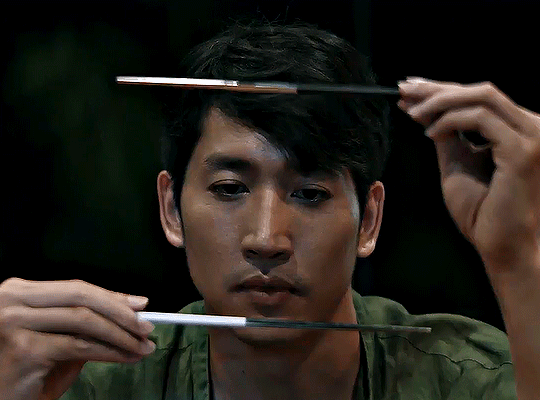
Enter Inthawut. Inthawut was Siam’s best friend, and with nothing to go on but a set of old pictures, Wang has an instinctual certainty that he is the key to the secret he’s seeking. And thus he engineers a way for he and his mom to “coincidentally” stumble onto Inthawut’s property and get invited to stay a few days in his isolated home, at which point Wang begins his campaign to figure out what the hell happened between Siam, Sasiwimol, and Inthawut at any cost.
One of the things I find most interesting about this story is how much the plot hinges on Wang going against Asian cultural norms in his pursuit of the truth. He is not respectful to his elders. He does not maintain filial piety and deference to his mother. He refuses to restrain his emotions. Instead, he is pushy and relentless and emotionally manipulative (all tricks we can plainly see he learned from Sasiwimol) and Inthawut doesn’t stand a chance against him. And so, because Wang explicitly acts against these cultural values, the truth comes out and the trauma is no longer suppressed.
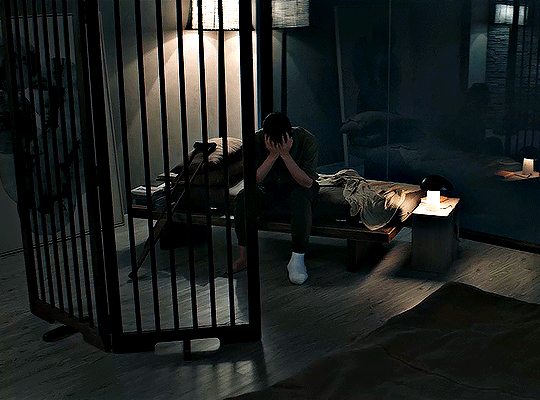
And in the end, it’s a simple, if desperately sad story: Siam and Inthawut were in love, but Inthawut was battling internalized homophobia and deep-seeded fear and so he relentlessly pushed Siam away and toward dating and then marrying their friend Sasiwimol. And when Siam, miserable in this heterosexual relationship he never actually wanted, finally snapped and confessed his true feelings, Inthawut rejected him and ran away to study abroad. Inthawut was running due to his own fear, but he also had noble notions of somehow protecting Siam from his own queerness and told himself that if he was gone, Siam would accept his heterosexual life. Of course, that did not happen, and in the fallout of this rejection Siam sank further into alcoholism and died soon after. Inthawut’s reaction was the exact worst fear of all gay people who work up the courage to confess to a friend they have developed feelings for: outright rejection, abandonment, and destruction of the relationship. And in his mind, he did this to Siam “for his own good,” a fairly textbook execution of the noble idiocy trope. In the aftermath, we see how Inthawut has isolated himself, part in penance, part in self-protection, and intellectualized his way to a romantic construction of his own cowardice that he tries to convince Wang is righteous.
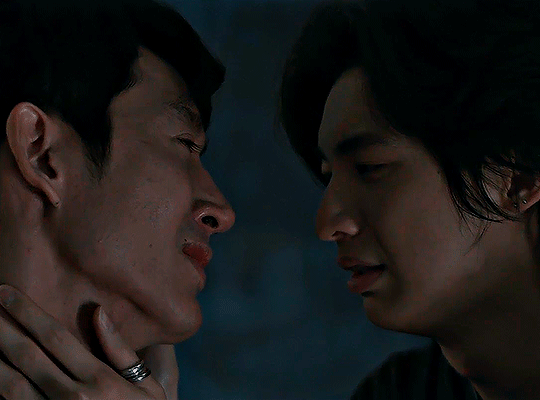
But Wang is deeply affected by how the denial of his father’s queerness ruined his life and is absolutely not having any of Inthawut’s self-denying bullshit, and this is where things get messy, as both Wang and Inthuwat seem to start seeing Wang and Siam as interchangeable and they develop an emotional entanglement that is deeply unhealthy, to say the least. Wang wants to understand Siam so badly that he starts to be him, and Inthuwat is so desperate to address his regret and shame that he starts to see Wang as Siam, as well. Wang also uses this attachment as a way to shock his mother and forcefully bring her real feelings about Siam and Inthawut to the surface. Despite Wang’s many loud protestations to the contrary, I don’t believe that he and Inthawut actually love each other. They are using each other to work out their trauma about Siam.
And they’re not the only ones! Sasiwimol seems to have her own psychological confusion about Wang as he relates to Siam, and their dynamic is very strange as a result. She refers to Wang as dua-eeng (and has taught him to do the same with her rather than calling her “mom”), a Thai endearment that literally means “self” but is often used between lovers. They have a very physically affectionate relationship that often had me grimacing in discomfort, and she clearly sees Wang as both a source of pain—because he is so like Siam—and her one source of comfort and happiness. She is a successful woman by any standard, but she’s also desperately lonely, hanging on tight to Wang as her only companion in a way that often veers into overbearing, and deeply wounded by her past with Siam and Inthawut. It was through her own friendship with Inthawut that she pursued Siam in the first place, and she clearly feels betrayed not only by Siam, but by Inthawut, both for getting in the way of her relationship with Siam and for leaving them. Her feelings about both men are complex and the story never fully spells them out, in part because Sasiwimol never does. Determinedly not thinking about what happened between them is a big part of how she copes, along with sublimating her suspicions into homophobia, which she perpetuates quite intentionally in her work via production of heterosexual romance propaganda.

Wang clearly loves his mother even as he is frustrated by her prejudices, her desire to control him, and her tendency toward emotional manipulation. He is a perceptive kid and he has studied her closely; he understands her very well and can often predict exactly how she’ll react to a situation. Which is why his decision to announce baldly to her face that he is in love with Inthawut—not only coming out as gay but declaring his intention to move out of her home and in with a man 20+ years his senior who is deeply entangled with her own trauma—felt very intentional to me. He knew what kind of reaction that would get from her, and he wanted it. And sure enough, Sasiwimol crumbles at this repetition of her trauma and the perceived disloyalty of Wang choosing Inthawut over her just as his father did. The rest of the emotion she’d been holding back comes pouring out, resulting in the three of them finally airing out everything that lies between them and everything they are feeling about the Siam-shaped hole in their lives. And once she breaks down, Wang is able to forgive her for the grievance she’s caused him and ultimately decides to remain filial and continue living with her, because he does not actually want to punish his mother for what happened to his father.

So, in the end, where did the story leave us with all this trauma? I can’t really say that any of these characters have healed, but I do think Wang kick-started that process, at least for himself. He got what he needed most out of this little scheme: deeper understanding of who his father was and why his life took such a drastic turn. He remains caught in the dysfunctional dynamic with his mother, and I’m not sure he’ll ever fully break out of it, but at least there is more honesty between them now about what they’re dancing around. She now knows he is gay and she has to accept it to keep him with her, and given that he has backed off from asking her to accept something much scarier than that, I do think she will find a way to make her peace with it. Inthawut is the character who seems to have progressed the least, standing firmly in his stasis and remaining determinedly alone with his pain, though the show leaves us with a note of ambiguity that suggests he may someday find the courage to move on.
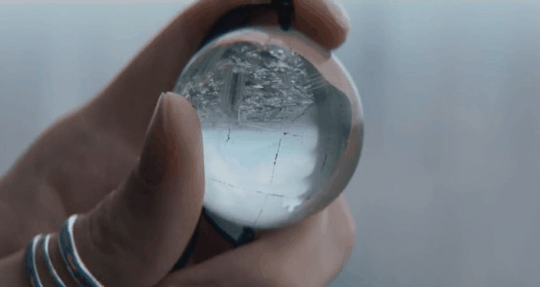
The messages of this work are clear. Internalized homophobia and denial of your own queerness are poison for your soul. Rejecting a loved one “for their own good” is an act of cowardice and selfishness, not an act of love. Hiding from and sublimating your trauma will never allow you to heal. Refusing to process your pain will only lead to you pushing it down on the next generation. Ultimately, this story told us that bravely looking ourselves and our trauma in the face and confronting our truths head on is the only way to begin to heal, and that running from them only leads to ruin.
#180 degree longitude passes through us#thai drama#intergenerational trauma challenge#shan shouts into the void
150 notes
·
View notes
Text
How to write an elderly main character?
I'm back! Because school is quite busy and I'm about to take exams, I don't have time to post new articles. I wonder if anyone remembers me. (probably not, lol)
There are many novels that feature elderly as main characters, for example, "The Hundred-Year-Old Man Who Climbed Out the Window and Disappeared" by Jonas Jonasson or "Our Souls at Night" by Kent Haruf. Today, I'll show you a few tips for writing this type of character.
When writing an elderly main character, it's important to approach the portrayal with sensitivity, authenticity, and a nuanced understanding of the aging process. Here are some tips to consider when developing an elderly main character:
Characterization: Create a well-rounded character with depth and complexity. Consider their personality traits, background, life experiences, and values. Remember that elderly individuals, like people of any age, can have diverse personalities and interests. Give your character hobbies, interests, and passions that reflect their individuality and bring richness to their life. Older adults can have a wide range of hobbies, such as gardening, art, music, or storytelling, which can add depth to their character.
Realism: Research and understand the aging process. Gain insights into the physical, cognitive, and emotional changes that commonly occur in older adults. This will help you create a realistic portrayal of your elderly character and avoid stereotypes or misconceptions.
Language and Dialogue: Reflect the character's age and life experience in their language and dialogue. Consider the vocabulary, speech patterns, and cultural references that may align with their generation. However, be cautious not to overuse stereotypes or make assumptions about their language abilities.
Challenges and Strengths: Portray the challenges and strengths that come with aging. Depict the character's struggles with age-related issues such as health concerns, memory loss, or changes in mobility. These changes can impact how your character interacts with the world and inform their daily routines and challenges. Also, highlight their resilience, wisdom, and life experience as sources of strength.
Relationships and Interactions: Explore the character's relationships with people of different ages, including family members, friends, and younger individuals. Show how their interactions and perspectives may differ from those of younger characters, while also highlighting the potential for intergenerational connections. This can involve exploring intergenerational conflicts, mentorship, or the passing down of wisdom and traditions.
Avoid Ageism: Be mindful of ageist stereotypes or biases and avoid perpetuating them in your portrayal. Treat the character with respect and dignity, highlighting their agency, autonomy, and ongoing personal growth.
Emotional Depth: Explore the character's emotional landscape, including their joys, fears, regrets, and aspirations. Show their emotional growth and the ways in which they navigate and adapt to life's challenges.
Seek Input: Consider seeking input or feedback from older adults or conducting research to gain firsthand insights into their experiences. This can help ensure an authentic portrayal and avoid generalizations or assumptions.
Life History: Develop a backstory for your character that encompasses their life experiences, significant events, and milestones. Consider how their past has shaped them and influenced their perspectives, values, and motivations.
Cultural Context: Take into account the cultural and historical context in which your character grew up and lived their life. Different generations may have distinct cultural references, societal expectations, or historical events that have influenced their worldview.
Social Roles: Explore the roles your character has played throughout their life, such as parent, grandparent, spouse, or professional. Consider how these roles may have evolved over time and how they perceive their identity in relation to these roles.
Please remember that every character is unique, and individual differences should be considered when writing an elderly main character. Approach the portrayal with empathy, respect, and a commitment to representing the complexity and richness of older individuals' lives.
If you want to read more posts about writing, please click here and give me a follow!
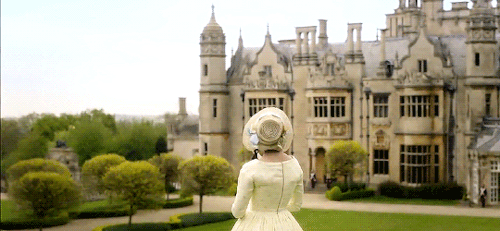
#writing#creative writing#writerscommunity#writer things#writersociety#on writing#writers#writeblr#writers on tumblr#writblr#writings#words#writer#write#writers and poets#writersofinstagram#writerscorner#writerslife#writing stuff#writing tools#writing prompt#writing community#writing tips#writing inspiration#writing advice#elderly#character profile#original character#character design#my characters
249 notes
·
View notes
Text
Yeah this can go on the Jumblr blog too because for some reason this film woke up something deep in my neshama even though I can't say it was the "best" movie I've seen this year (although it is very good) it is the one that stuck with me the most. For some reason I came out of it really wanting to start studying The Talmud again and I don't know why because the main characters in the film aren't super observant and it only came up once lol.
I saw A Real Pain recently. Really beautiful, really healing, and very, very Jewish in the best way. I highly recommend but I don't know how it will hit for everyone, though I don't think you have to be Jewish for the themes of generational trauma and difficulty reconciling the enormity of the world's grief with the legitimacy or complexity of your own personal pain in the face of that is only a Jewish thing. So I think it'll hit for other people but I appreciated it was also very by the Jews for the Jews in a way that despite the stereotype about us CoNtRoLlInG tHe MeDiA is actually very rare.
#I also really liked the diversity of Jewish experience in the film#I liked that the convert character was not the subject of jokes and was treated just as Jewish as anyone else#and he and Jesse Eisenberg have this conversation about observance and Shabbat that feels like a conversation I could have and had have eve#though the dialogue is a bit quippier in the way you'd expect from an Eisenberg movie#but not so much that it is distracting#A Real Pain#and obviously trigger warning for#holocaust mention cw#it's a film about the grandchildren of a Holocaust survivor so obviously trigger warning for discussions of intergenerational trauma#but there is nothing exploitative or graphic on the screen#though that can be more haunting
34 notes
·
View notes
Text
(Panel Session 6) 6th World Forum on Intercultural Dialogue.
"Opening eyes and building contact: Tourism connecting people and its role in building intercultural dialogue"
Keynote speaker:
Mr. Fuad Naghiyev, Chairman of the State Tourism Agency of the Republic of Azerbaijan
Moderator:
Dr. Jafar Jafari, Founding Editor, Annals of Tourism Research
Panelists:
Mr. Jasmin Ademović, the Chairman of the Sarajevo City Council
Ms. Rosette Chantal Rugamba, Founder and Managing Director, Songa Africa, Rwanda
Mr. Miguel Carvajal, Co-founder and General Director, Get up and Go Colombia
Ms. Lucy Garner, Senior Expert on Youth and Talent Development, UN Tourism
Ms. Daniela Otero, Interim Chair, World Committee on Tourism Ethics
Closing remarks: Ms. Zoritsa Urosevic, Executive Director, UN Tourism
Related Sites and Documents
6th World Forum on Intercultural Dialogue website Baku Process Home Page
Watch the (Panel Session 6) - 6th World Forum on Intercultural Dialogue!
The 6th World Forum on Intercultural Dialogue will be held in Baku, Azerbaijan, 1-3 May, under the title "Dialogue for Peace and Global Security: Cooperation and Interconnectivity".
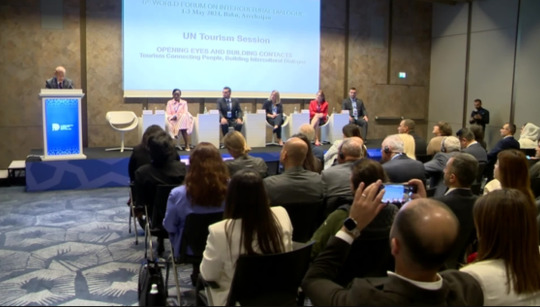
#unesco#world forum on intercultural dialogue#intergenerational dialogue#intercultural dialogue#tourism ethics#panel session#connecting people#unwto#global security#dialogue for peace
0 notes
Text

my favourite scene in this year's Christmas special. At least for my first time watching it. I love it when they're not making Sister Veronica the comic relief and nothing else. and Geoffrey has been lovely from the first moment, and can we please please keep him? He's kind and funny and shows his depth in scenes like this one.
Those kitchen-scenes with two or three people talking or busy making something are some of the best in the entire show:
Sister Evangelina and Sister Monica Joan and their "you are irreplaceable" dialogue makes me bawl instantly.
Fred giving his breakfast to Jenny after Alec's accident - that's what we're her for.
Sister Winifred and Sister Evangelina sewing name tags into Tim's clothes for grammar school, talking about their vows and how they are difficult makes me wanna hug Pam Ferris like my grandma.
Trixie ironing her clothes the night before Sister Evangelina's funeral and Phyllis comforting her - that is the kind of intergenerational friendship that makes the show so precious.
Valerie in the kitchen at night and Sister Monica Joan comes in, recalling her birth and showing us the connection between the woman standing before her and the friend she has lost after so many years of living and working together - WATERFALLS!!
And then in this new episode, one of the perkier nuns and her artistic friend sharing thoughts about marriage and musing if it is for them. and also Chutney!
26 notes
·
View notes
Text

What is RISE?
Reigniting Intergenerational Sisterhood Everywhere
Are you interested in building intergenerational lesbian community? Are you a feminist seeking to make change? Do you want to spend a week in the woods with sisters from all walks of life? Join us at RISE.
What does sisterhood mean to you? The gathering is designed around community dialogue and learning from each other: we differ in age, race, class, ability, life experience, and opinions. Workshops will include topics in intergenerational lesbian community-building, organizing for change, intersectional feminism, and preserving lesbian cultural heritage. We aim to build trust through open sharing and respectful listening in this focused, intimate setting. Aside from the core programming, RISE offers the chance to bond in person with other women during concerts, dances, movies, coffeehouse open mics, skill-shares and swaps. We each bring our energy and gifts to the Land and leave with new friends, skills and ideas. We are participant-driven. If you want to see something happen here, create it!
WPI-RISE
RISE is sharing our week on the Land with WPI music camp for women and girls. All performances and RISE workshops will be open to everyone attending either festival; if you want to attend WPI music classes, you'll need a WPI ticket.
Tickets
Getting your ticket is a 2-step process. First, registerat tinyurl.com/RISE24reg— once you're registered, you'll receive an email from [email protected] with the link to purchase your ticket at Goldenrod. The standard rate is $325: sliding scale options & payment plans available (just ask).
Volunteer Opportunities
We have several opportunities for organized women to help with various aspects of RISE. In particular, we're currently looking for sisters to MC a coffeehouse open mic, to help make & serve beverages in our festival coffee shop, and for one more on-call conflict mediator. Email [email protected] with your interest & experience. We are also still soliciting workshop & discussion leaders. What topic would you like to bring to RISE? Sign up to lead a workshop or discussion here: tinyurl.com/RISE24workshop
70 notes
·
View notes
Text
It's insane to me that people are arguing that EEAAO is just like... not at all intellectually engaging. And I really think it's kind of just really bizarre to argue that just because something is positive, it must be... stupid? Or at least lacking in intellectual stimulation.
Like... EEAAO is a deeply philosophical film, even if people aren't waxing poetic about it in the dialogue. Like, we have the basics of the LITERAL philosophies its invoking like yin and yang (and more from philosophies and religions I'm not informed enough on to talk about any length, I'll admit that here), nihilism, and, yes, the existence of a multiverse and what it means to have multiple "selves" which is a metaphysical topic... you're just used to it being diluted by comic book franchises whcih want to have an excuse to reuse the same characters five times and avoid narrative consequence.
And even beyond the like direct philosophical narrative... this film is dealing with extremely deep and... traumatic topics?
Intergenerational trauma and indeed the cyclical nature of suffering isn't a shallow topic just because it's end thesis is that healing is possible and connections can be reformed. It's a film obviously aware of race but also gender, class, and sexuality and doesn't just use those as like "Look, we're diverse, give us points!" fodder. It's dealing with adult issues (including fucking TAXES) with room to be silly.
If you're blinded by hot dog fingers and assuming that means this film is intellectually void, I think... you might be the vapid one. Like, I'm not going to argue this film is genius tier stuff but it is ABSOLUTELY intellectually engaging, narratively and philosphically rich, and has compelling, human stories that exist beyond the surface level. If you are getting lost in the silly veneer, that's absolutely an indictment of YOUR character, not the film itself.
This has the same energy as people calling Nope an empty film. Might not be my place to call it out but it kinda just feels like a knee jerk racist reaction and in inability to parse narratives that aren't exploring "relatable" (ie white) stories. Because like... EEAAO is begging you to engage with its narrative on multiple levels the entire way through, if you aren't doing that... on some level you are just CHOOSING to not do that
#honestly a lot of 'gritty' and 'real' story telling#is a LOT less intelectually stimulating than positive media#because its just meant to confirm your own biases#and angst#lol
523 notes
·
View notes